
University of Richmond Students Cordially Invited to


University of Richmond Students Cordially Invited to

(NINTH
REV . BEVERLEY D. TUCKER, JR., D. D., RECTOR
SUNDAY SERVICES
9 :45-Bible Classes and Sunday School
11 :00-Morning Prayer and Sermon
8 :15-Evening Prayer and Sermon
Vested Choir of 40 Voices With the Following Soloists:
Tenor-Joseph Whittemore Soprano-Mrs. Frances W. Refohart Bass-Norman Call Alto-Mrs. F. Flaxington Harker F. Flaxington Harker, Director and Organist
5T.PAUL'S is the historic "Church of the Confederacy," referred to by Mrs. Jefferson Davis a~ "The ,.Weal,• minster Abbey of the South." Pews occupied by Presi'dent Davis and General Robert E. Lee are marked \>,y silver tablets. The memorials to Confederate leaders and others are among the most beautiful in the entire country
A liberal Christian message, for thoughtful and forward-looking young men and women is preached from its pulpit

"We, the members of the First Baptist Church of Wartburg, Tenn., desire to express our appreciation for the kindness, liberality and skill of Kellam Hospital, Richmond, Va., shown our beloved Pastor, Rev. I. H. Bee, in the successful cure of that dread disease, cancer, and his restoration to us in perfect health and, we trust, many more years of usefulness.
"And Further, Be it Resolved, That a copy of these resolutions be placed on the records of the church and a copy forwarded to Kellam Hospital.
"Done at regular session of the Church, this 9th day of August, 1925."
CARRIES. HONEYCUTT, Clerk and Treasurer.

Entirely new suburban home by January, 1926; progressive and orthodox faculty of eminent Christian scholars; comprehensive and practical curriculum; large and world-wide student fellowship; numerous student-served churches; tutition free; financial assistance where needed, and moderate expenses; the Harvard or Johns Hopkins of the theological world.
Twenty-two University of Richmond students last Session. University of Richmond third among 167 schools. University of Richmond men have high rating.
Write E. Y. MULLINS, President


1. Richmond College, a College of Liberal Arts for Men.
2. Westhampton College, a College of Liberal Arts for Women.
3. The T. C. Williams School of Law, a Professional School of Law, offering the Degree of LL. B.
4. The Summer School. W. L. Prince, M. A., Director.
W . L. PRINCE, M. A., DEAN
Richmond College for Men is an old and well-endowed College of Liberal Arts, which is recognized everywhere as a Standard American College. Its degrees are accepted at face value in the great graduate and technical schools of America. Its alumni arc so widely scattered through the nation that the new graduate immediately joins a large and friendly group of men holding positions of power and influence. The College occupies modern and well-equipped buildings, on a beautiful campus of 150 acres in the western suburbs of Richmond.
MAY LANSFIELD KELLER, PH D., DEAN
\Vesthampton College for Women, co-ordinate with Richmond College for Men, is housed in handsome buildings on a campus of 140 acres, separated from the Richmond College campus by a beautiful lake of about nine acres. All degrees are given by the University of Richmond, and those conferred on women arc, in all respects, equivalent to those conferred on men. While the two institutions are co-ordinate, they arc not co-educational.
J H. BARNETT, JR., LL. B., SECRETARY
Three years required for degree of LL. B. in the Morning Division, four years in the Evening Division. Strong faculty of ten professors. Large Library. Moderate Fees. Open to both Men and VJ,;imen. Students who so desire can work their way.
For catalogue, booklet, or viewa, or other information concerning entrance into any College, address the Dean or Secretary.
F. W. BOATWRIGHT --President

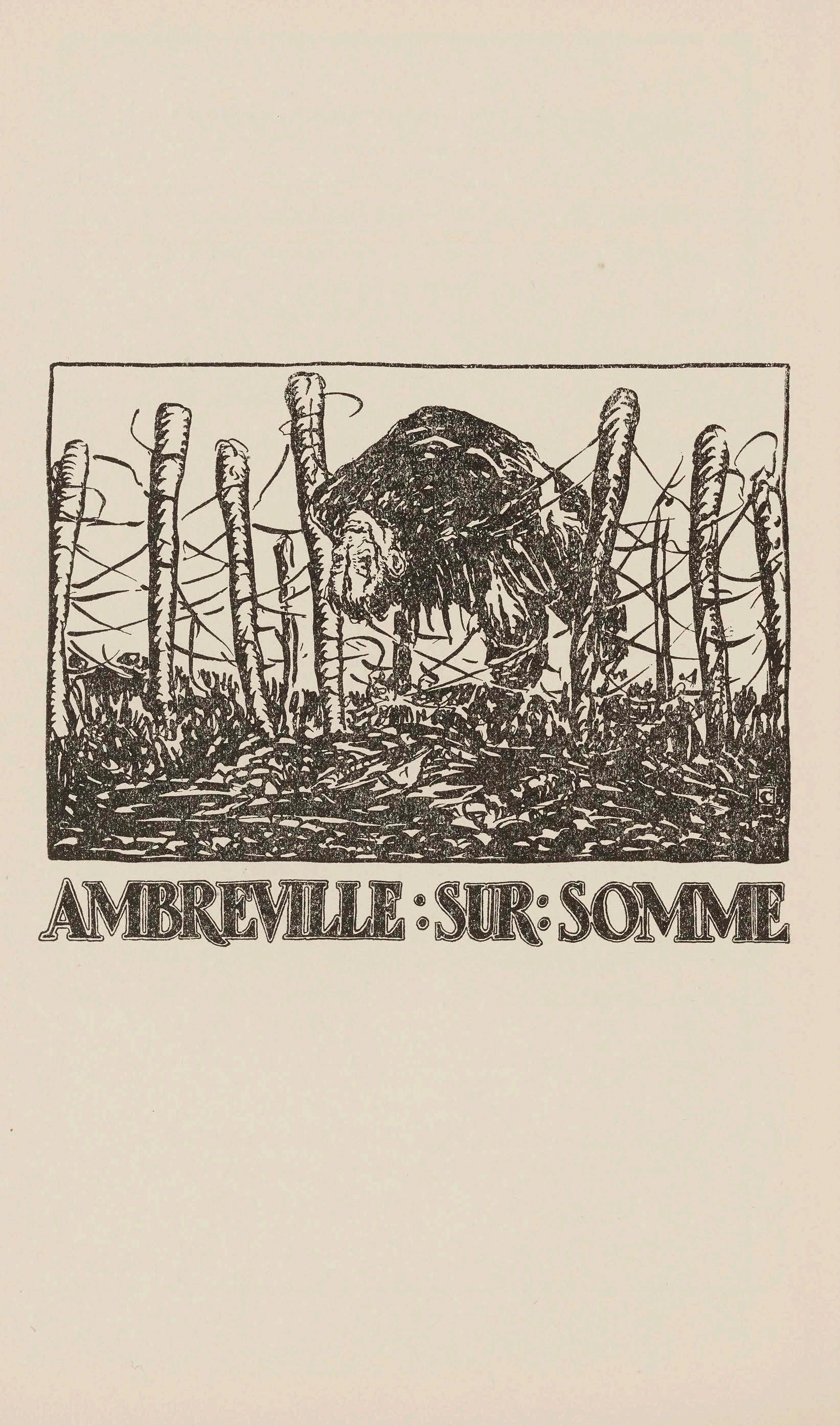
COPYRIGHT
111211 BY
LESLIE L. JONES
1926

I wonder, if in Ambreville, (Now that soft winds blow) Red poppies bloom at Princess PostWhere Death aye : liked to go
Where Death aye liked, with stealthy tread , To show her fixed grin . . . 0, Princess Post was a breathless place To put a young lad in.
For lithesome lads are warm of blood , While Death has a constant chill. Each night she came, for lovers tall, To the wrack of Ambreville
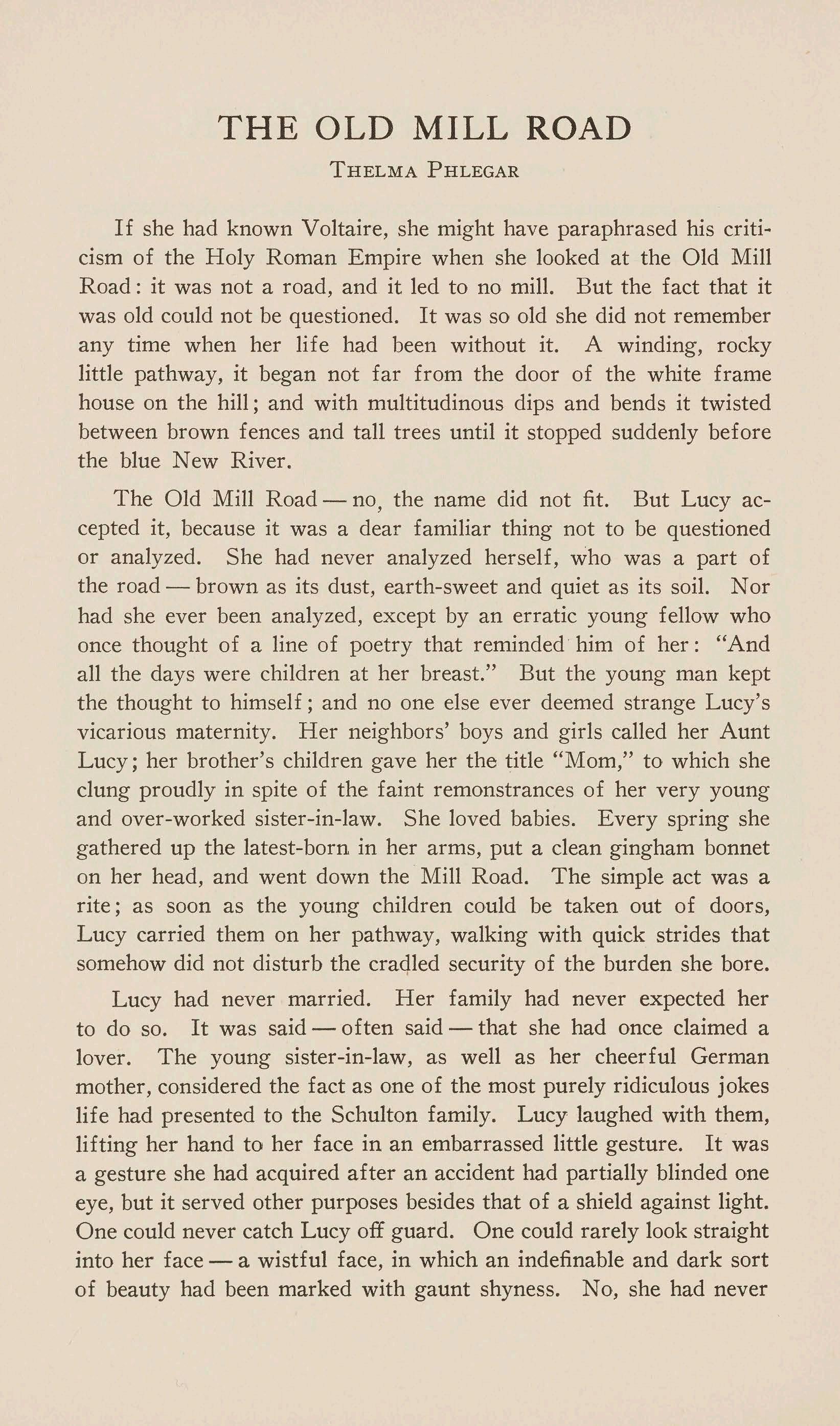
THELMA PHLEGAR
If she had known Voltaire, she might have paraphrased his criticism of the Holy Roman Empire when she looked at the Old Mill Road: it was not a road, and it led to no mill. But the fact that it was old could not be questioned. It was so old she did not remember any time when her life had been without it. A winding, rocky little pathway, it began not far from the door of the white frame house on the hill ; and with multitudinous dips and bends it twisted between brown fences and tall trees until it stopped suddenly before the blue New River.
The Old Mill Road-no, the name did not fit. But Lucy accepted it, because it was a dear familiar thing not to be questioned or analyzed. She had never analyzed herself, who was a part of the road - brown as its dust, earth-sweet and quiet as its soil. Nor had she ever been analyzed, except by an erratic young fellow who once thought of a line of poetry that reminded him of her: "And all the days were children at her breast." But the young man kept the thought to himself; and no one else ever deemed strange Lucy's vicarious maternity. Her neighbors' boys and girls called her Aunt Lucy; her brother's children gave her the title "Mom," to which she clung proudly in spite of the faint remonstrances of her very young and over-worked sister-in-law. She loved babies. Every spring she gathered up the latest-born in her arms, put a clean gingham bonnet on her head, and went down the Mill Road. The simple act was a rite; as soon as the young children could be taken out of doors, Lucy carried them on her pathway, walking with quick strides that somehow did not disturb the cracjJed security of the burden she bore.
Lucy had never married. Her family had never expected her to do so. It was said-often said-that she had once claimed a lover. The young sister-in-law, as well as her cheerful German mother, considered the fact as one of the most purely ridiculous jokes life had presented to the Schulton family. Lucy laughed with them, lifting her hand to her face in an embarrassed little gesture. It was a gesture she had acquired after an accident had partially blinded one eye, but it served other purposes besides that of a shield against light. One could never catch Lucy off guard. One could rarely look straight into her face -a wistful face, in which an indefinable and dark sort of beauty had been marked with gaunt shyness. No, she had never
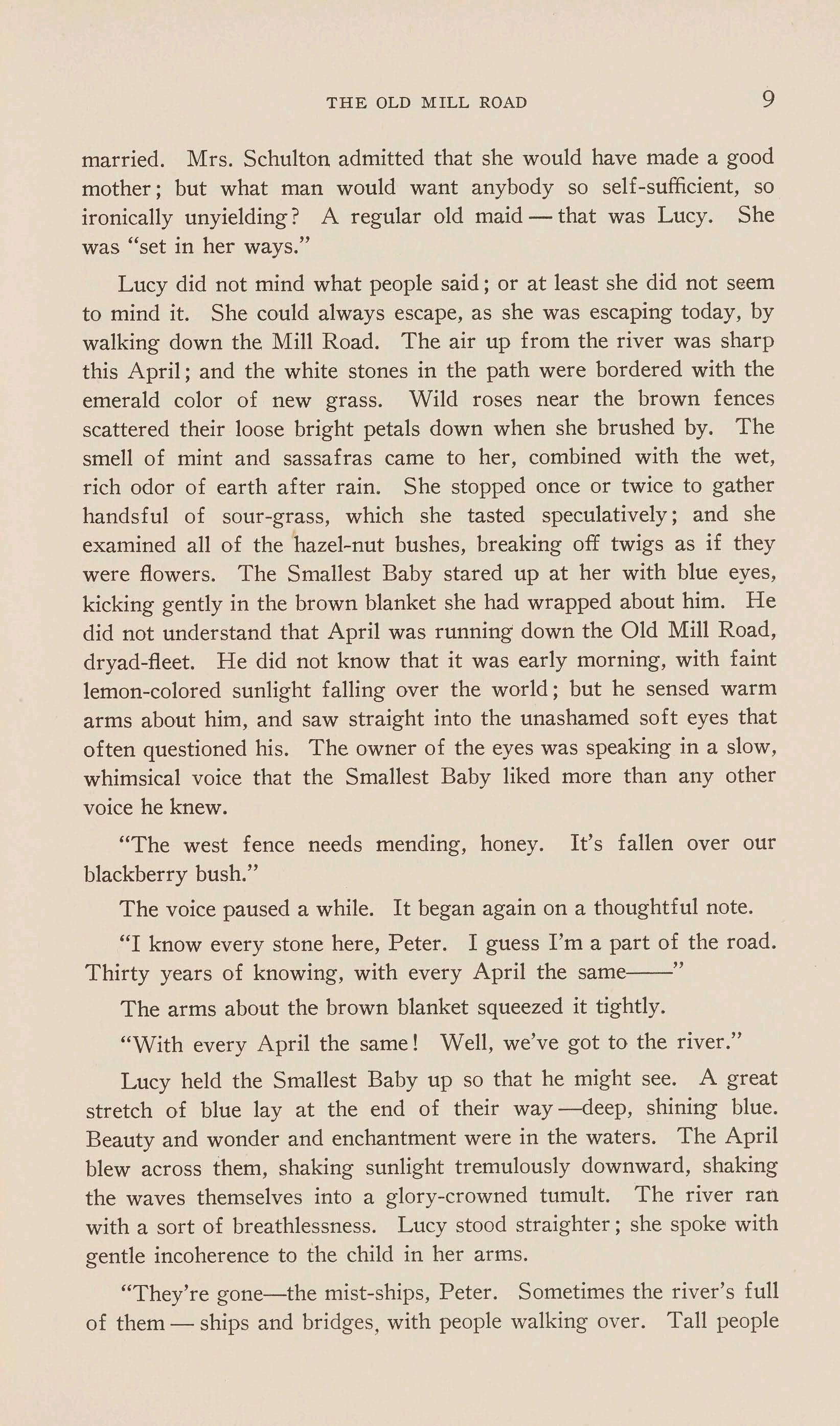
married. Mrs. Schulton admitted that she would have made a good mother; but what man would want anybody so self-sufficient, so ironically unyielding? A regular old maid -that was Lucy. She was "set in her ways."
Lucy did not mind what people said; or at least she did not seem to mind it. She could always escape, as she was escaping today, by walking down the Mill Road. The air up from the river was sharp this April; and the white stones in the path were bordered with the emerald color of new grass. Wild roses near the brown fences scattered their loose bright petals down when she brushed by. The smell of mint and sassafras came to her, combined with the wet, rich odor of earth after rain. She stopped once or twice to gather handsful of sour-grass, which she tasted speculatively; and she examined all of the hazel-nut bushes, breaking off twigs as if they were flowers. The Smallest Baby stared up at her with blue eyes, kicking gently in the brown blanket she had wrapped about him. He did not understand that April was running down the Old Mill Road, dryad-fleet. He did not know that it was early morning, with faint lemon-colored sunlight falling over the world; but he sensed warm arms about him, and saw straight into the unashamed soft eyes that often questioned his. The owner of the eyes was speaking in a slow, whimsical voice that the Smallest Baby liked more than any other voice he knew.
"The west fence needs mending, honey. It's fallen over our blackberry bush."
The voice paused a while. It began again on a thoughtful note.
"I know every stone here, Peter. I guess I'm a part of the road. Thirty years of knowing, with every April the same--"
The arms about the brown blanket squeezed it tightly.
"With every April the same! Well, we've got to the river."
Lucy held the Smallest Baby up so that he might see. A great stretch of blue lay at the end of their way -deep, shining blue. Beauty and wonder and enchantment were in the waters. The April blew across them, shaking sunlight tremulously downward, shaking the waves themselves into a glory-crowned tumult. The river ran with a sort of breathlessness. Lucy stood straighter; she spoke with gentle incoherence to the child in her arms.
"They're gone-the mist-ships, Peter. Sometimes the river's full of them -ships and bridges , with people walking over. Tall people
- taller than Angel's Rest, and that's a very big mountain. Well, maybe not that tall. But they're always in a hurry and they drop things in the water. Bridges and ships--"
Her voice lilted, grew certain and unafraid. The clean starched sunbonnet had fallen away from her face, in which there was a look of child-like eagerness. She felt the need for someone to corroborate the admittedly foolish things she had said. Babies had a way of granting impossibilities, so she appealed to Peter. He had fallen asleep. For a second she looked at the small untroubled face with mild reproachfulness; then she wrapped the blanket closer, and started home. Shadows and ships! Lucy, the "regular old maid"! Ma would laugh at that. Lucy herself started to laugh, ceasing only because she was afraid of waking Peter.
They called it the Old Mill Road. But it was not a road, and it led to no mill. At the end was a vast blue river, singing in the wind.

JOHN KEATS
REYNOLDS FREEDLEY
Death is a stupid little boy bent on venting his rage in strange ununderstandable jealous ways as if he feared that the white-faced, lean-drawn poet, with the red-gold hair crinkly-frozen on his brow, might fathom the bitter-guarded secret of our sharp existence

WARREN A. M cN EILL
( The principal feature of the stage setting is the desk of the city editor of a newspaper, covered with letters, sheets of copy paper, other newspapers, a wire basket contalining sheets of copy and a spike 'iuith several sheets of paper on it. The city editor, only character in the play, sits at the desk blue-penciling a story as the curtain rises. He carries on the telephone conversation indicated, filling in pauses by handling mail, throwing letters in a waste basket beside the desk or putting them into the wire basket. Sometimes he reads through a story and after finishing the work of correcting it sticks it on the spike. The phone. must ring at the points indicated.)
( Picking up the receiver of the phone shortly after the curtain rises.) Give me the composing room, Bill.
(The phone rings a moment later and he answers it when he speaks.) Hello, Williams? See if you can get hold of that city council story, if it hasn't already been set, and hold it for a new lead. If it has been set, hold the type and get a proof to me as soon as you can. Thanks.
(Hangs up and continues to read copy - the phone rings.)
City editor speaking. Who? Oh, all right, Dave, what have you got? Suicide? Any one prominent? Don't the police know her name? Which apartment is it? Well, try to find out and go up there yourself. Wait at the door of the building until Taylor gets there and tell him which apartment it is so he can get a picture of the room it happened in. You try to get a picture of the girl. What? Of course they won't want you to have one-who in hell ever heard of a case where they did? But get one-steal it if necessary. I'm sending Bob up with Taylor to look things over and write a side story-you cover the straight news end. Report in if anything unusual comes up.
(Holding down the phone hook for a 1no1nent and immediately releasing it.)
Give me the art department. Hello, Taylor? Grab your camera and rush up to the Parkway Apartments. Have the boy get a taxi for you. Yes, suicide-young girl supposed to be quite good looking and of a prominent family-love affair they think. Dave will meet you up there. Try to get into the room it happened in and get a

flash. Help Dave get a picture of the girl-he seems to be a little squeamish about trying it-you'll probably know how to get it better than he will. If there is anything to this story I want a front page layout with the room and the girl. I'm having Bob go up with youhe will write the side story. Right.
(Again hanging up the receiver for a moment and putting in another caU.)
Give me Bob Dunn's desk. Hello, Bob? Meet Taylor in the art department and take a taxi with him. I want a good feature story on a suicide-yes, girl supposed to be of prominent family. Dave is covering the straight news end and will meet you at the Parkway Apartments and give you details. Better rush along. Call me back if anything breaks after you get there. I'm going to hold the city run for the story.
(Again changing the call.)
Get me police headquarters.
(Works on copy during the slight pause before his phone rings.) Hello, this is the News, city editor speaking. vVe have a tip on the suicide in the Parkway Apartments . Have you any details on that yet? Yes, we have a reporter up there, but I was wondering if you knew the girl's name or anything about the affair. I just want to know if it's going to be a big enough story to hold up the city run for. Yes, I understood that she was of a prominent family. All right, thanks. Let us know if you hear anything more, will you? Right. Call you later.
(Hangs up the receiver and works for a few moments, then portrays a bit of nervousness for the first time , as he snatches the receiver and calls.)
Give me outside. West 8496- J.
(After a pause.) Hello. What? Doesn't answer. All right, thank you.
(He again turns to the copy, but shows a little restlessness , tapping on the desk with his pencil. As the phone rings he jumps slightly and then answers it.)
City editor speaking. All right, Dave , what about it? Dorothywho? Oh, my God !-Oh nothing-what else have you found out? A note? What does it say? Haven ' t read it yet? Call me as soon

as the police let ·you see it. Yes, make them-tell them we've a right to know what's in it-bluff them, anything-but see it.
(A slight pause during which the editor bites his lip and hesitates before asking.)
Did Taylor get the picture? All right, tell him to come back and rush it to the engraver. Yes, let him bring the picture of the girl, too. You stay with the police. Tell Bob to come back as soon as he can-I'm going to hold the city run.
(Hangs up and then makes a new call.)
Give me the composing room. Hello, Williams? Let the mail go, but bring back page one and a runover page for the city run. Yes, complete make over, layout, news story and feature story-probably an eight-column ribbon.
(Works nervously for a minute until the phone rings.)
All right? Yes, Dave. Hell with my feelings! What did the note say? Name used? What? Goddamn you, if you were here I'd break your head for that! Of course, we'll use it. Copy the whole note. All of you get in with your story and pictures as quickly as you can, I'm making over the city run.
(Hangs up and makes a new call.)
Give me the morgue. Hello, Jones? City editor speaking. Get out that one column cut of me and send it to the art department.
(Making another call.)
Get the art department. Hello ! Get the backing ready for a four column layout for page one. Four column top, interior of room-Taylor's coming in with it. Two column inset cut underneath of girl suicide-Taylor has that, too,-and one column of me. What? That's what I said, isn't it? You'll find out soon enough.
(Making another call.)
Get the copy desk. Hello, George. Make over page one and a runover for the city run. Yes, suicide-girl of prominent familyDorothy Denis. I'm having a four column layout made-no, one column underline. Use a number one head in column eight on the lead story and a two column F head on the side story Bob will write to go under the layout. Better put a 120 point ribbon across the top. Yes-you might make that:
(Before there can be any reply, he hangs up the receitver and leans across the desk, burying his head in his arms as the curtain falls, slowly.)

MARIAN MARSH
0 matchless light, be not so soon away; Haste not thy radiant self to yield to gloom; Countless thy joys and full while yet 'tis day; Night only brings woes mournful as the tombDelay awhile.
Too fair thy brow, e'en midst fast-failing light; Too palely blue thine eyes, too soft thy way, To be despoiled by passions of the night, And looming, lurid shadows, prithee, stayStay yet awhile!
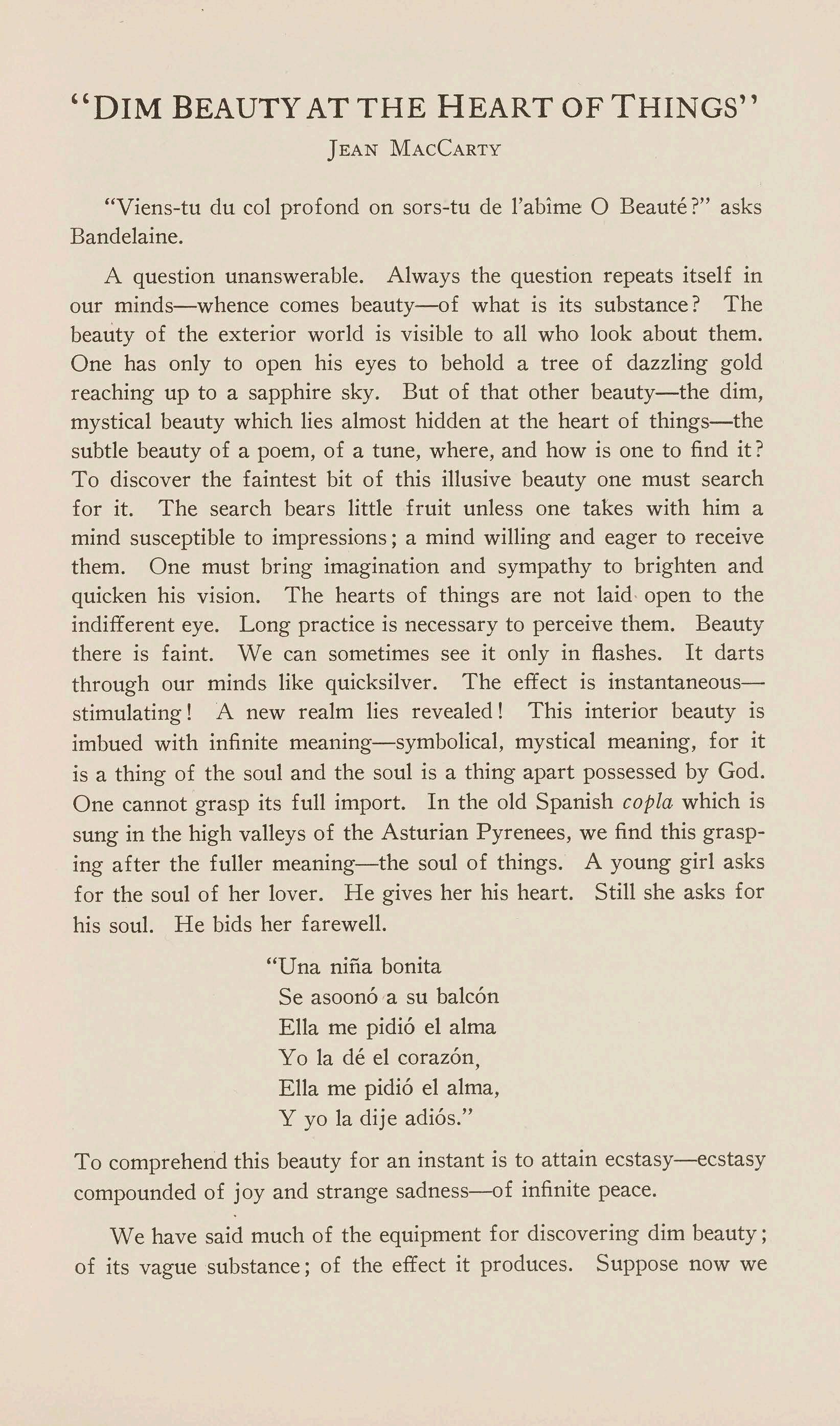
JEAN MACCARTY
"Viens-tu du col profond on sors-tu de l'abime O Beaute ?" asks Bandelaine.
A question unanswerable. Always the question repeats itself in our minds-whence comes beauty-of what is its substance? The beauty of the exterior world is visible to all who look about them. One has only to open his eyes to behold a tree of dazzling gold reaching up to a sapphire sky. But of that other beauty-the dim, mystical beauty which lies almost hidden at the heart of things-the subtle beauty of a poem, of a tune, where, and how is one to find it?
To discover the faintest bit of this illusive beauty one must search for it. The search bears little fruit unless one takes with him a mind susceptible to impressions ; a mind willing and eager to receive them. One must bring imagination and sympathy to brighten and quicken his vision. The hearts of things are not laid open to the indifferent eye. Long practice is necessary to perceive them. Beauty there is faint. We can sometimes see it only in flashes. It darts through our minds like quicksilver. The effect is instantaneousstimulating ! A new realm lies revealed! This interior beauty is imbued with infinite meaning-symbolical, mystical meaning, for it is a thing of the soul and the soul is a thing apart possessed by God. One cannot grasp its full import. In the old Spanish copla which is sung in the high valleys of the Asturian Pyrenees, we find this grasping after the fuller meaning-the soul of things. A young girl asks for the soul of her lover. He gives her his heart. Still she asks for his soul. He bids her farewell.
"Una nifia bonita
Se asoon6 a su balc6n
Ella me pidi6 el alma
Yo la de el coraz6n, Ella me pidi6 el alma, Y yo la dije adi6s."
To comprehend this beauty for an instant is to attain ecstasy-ecstasy compounded of joy and strange sadness-of infinite peace.
We have said much of the equipment for discovering dim beauty; of its vague substance ; of the effect it produces. Suppose now we

begin our actual search for it. Gaze into the heart of a dying fire. Perhaps the unbeliever says that a fire is not possessed of a heart. His eyes are closed. But look long. At first one may see only a large grey stone fireplace on whose hearth burn and crumble a few logs with tiny sparks darting from them. The spectacle stands out clearly. If one looks continuously a filmy mist begins to creep over the stones in the fireplace. The hearth recedes. Only hazy orange logs remain visible. Then the miracle ! A log splits. A shower of brilliant sparks fall about. One sees revealed the heart of fire! Where the log was a walled city has sprung up. It is an ancient city -who can name it? Suppose it were illusive Carcassone-the long desired of pilgrims? It is a city of orange and onyx. From the windows of the houses, which are closely crowded along high golden streets, flash bright reddish-orange lights. Down the streets roll carriages with swinging torches. In this city there is peace. !he dwellers in these houses are happy-are amicable. Perhaps they sometimes climb high upon the turrets of their city to gaze upon the "delectable mountains" far away. And yet they are at peace, for this is really Carcasonne, the city they have desired, the ideal city. One finds it only when one dreams or searches for "dim beauty at the heart of things."
You may wish to make comparison between this dim haunting beauty, enriched by the imagination, and the clearer beauty seen with the eye alone. In the early morning you pass across the square from a beautiful grey stone church. It is a broad square which allows you to see an expanse of glorious blue sky round the church. But especially do you look up through the grey arched towers where wise gargoyles cluster, to the blue beyond. This is obvious beauty. How much more subtle is the beauty of these grey towers in a hazy twilight, with the last faint streaks of sunset purple and gold vanishing. The spirit of the tower summons your spirit. Through those arched towers, through the mist of evening you "voyage a l'infini." Of course, we have only to look across a lake to the trees towering one above another, each a unit of pure beauty of color, to see conspicuous outward beauty. Again await "l'harmonie du soir." Now, you may pass a lake where only black trees which stand like sentinels high above, are mirrored in its pacific water. All in dim-grey and black. Dim beauty inspires introspective thought. It is more suggestive than obvious beauty. When you are in the presence of this
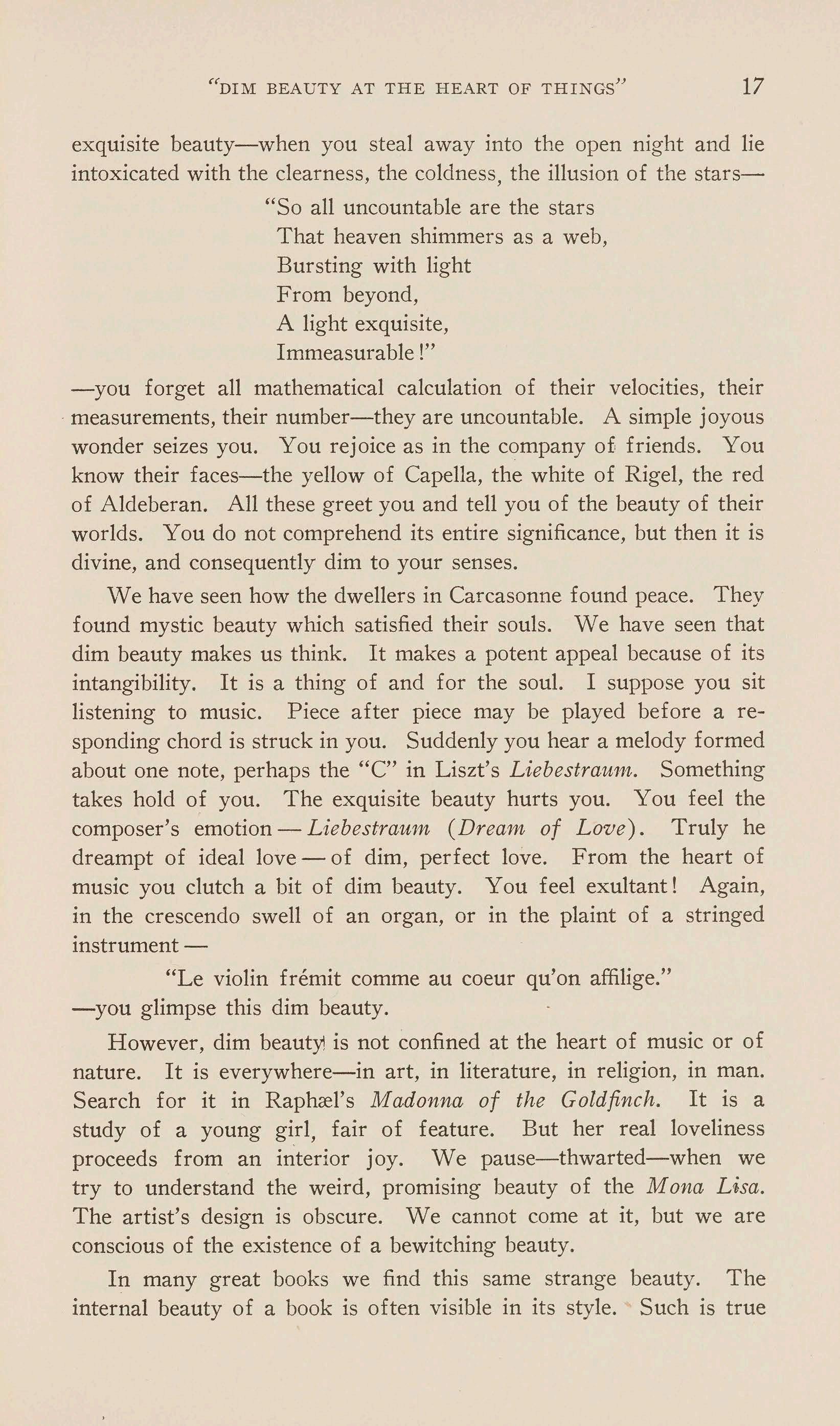
exquisite beauty-when you steal away into the open night and lie intoxicated with the clearness, the coldness, the illusion of the stars"So all uncountable are the stars That heaven shimmers as a web, Bursting with light From beyond, A light exquisite, Immeasurable!"
-you forget all mathematical calculation of their velocities, their · measurements, their number-they are uncountable. A simple joyous wonder seizes you. You rejoice as in the company of, friends. You know their faces-the yellow of Capella, the white of Rigel, the red of Aldeberan. All these greet you and tell you of the beauty of their worlds. You do not comprehend its entire significance, but then it is divine, and consequently dim to your senses.
\Ve have seen how the dwellers in Carcasonne found peace. They found mystic beauty which satisfied their souls. We have seen that dim beauty makes us think. It makes a potent appeal because of its intangibility. It is a thing of and for the soul. I suppose you sit listening to music. Piece after piece may be played before a responding chord is struck in you. Suddenly you hear a melody formed about one note, perhaps the "C" in Liszt's Liebestrau111,. Something takes hold of you. The exquisite beauty hurts you. You feel the composer's emotion - Liebestraum (Dream of Love). Truly he dreampt of ideal love -of dim, perfect love. From the heart of music you clutch a bit of dim beauty. You feel exultant! Again, in the crescendo swell of an organ, or in the plaint of a stringed instrument -
"Le violin £remit comme au coeur qu'on affilige." -you glimpse this dim beauty.
However, dim beauty! is not confined at the heart of music or of nature. It is everywhere-in art, in literature, in religion, in man. Search for it in Raphcel's Madonna of the Goldfinch. It is a study of a young girl, fair of feature. But her real loveliness proceeds from an interior joy. We pause-thwarted-when we try to understand the weird, promising beauty of the Mona Lisa. The artist's design is obscure. We cannot come at it, but we are conscious of the existence of a bewitching beauty.
In many great books we find this same strange beauty. The internal beauty of a book is often visible in its style. Such is true

of the sensuous, poetic style of A Dreamer's Tales, by Dunsany, of the Land of Heart's Desire and Shadowy Waters by Zea ts. In Shadowy Waters the hero guides his ship over the rim of the world to find his ideal-perfect love. Dim beauty exists in Cabell's Soul of Mellicent. Here one finds exquisite language. In Pecheur D'lslande, by Pierre Loti, one faces the mysterious beauty and potency of the sea. Sylvestre is lured in search of the meaning of the sea until he is drowned and thereby accomplishes his mystic "noces avec la mer."
In religion many have discovered the true beauty. Mystics of all ages have experienced it-Fray Luis de Leon, Santa Teresa, St. Catherine of Sienna. Mystics apparently come nearer to perfect beauty than do other people. They penetrate the heart of things and at times see beauty which is no longer dim, but so brilliant that it causes ecstasy. In; Corneille's PoJyencte, where the religious ideal triumphs, we see Polyencte's entire disregard for this world when he once begins his quest after ideal beauty.
"J'ai de }'ambition, mais plus noble et plus belle Cette grandeur perit, j'en veux une immortelle, Un bonheur assure, sans mesure et sans fin, Au-dessus de I'envie, au dessus du destin."
The craving for the remote, the visionary beauty and felicity was explained long ago by the sage who wrote in Ecclesiastes "He has put eternity into their hearts."
Our search may have led us a little closer to the shadowy remote beauty which is yet so palpable once experienced. Is the search worth while? Flanbert said, "The only way not to be unhappy is to shut yourself up in art, and count everything else as nothing." And yet one may starve for beauty in the midst of the commonplaceness of Iif e. There is beauty in the courage which faces the commonplace. Then, when one's epic is done, when one becomes very old and wrinkled like the "Anciana Mexicana" in Alice Corbin's poem, one may do as she does-smoke and dream all night. To ancient eyes much dim beauty is revealed, for they have time to look , for it. No longer are they jostled by the work of the day. The compensation for old age is imminent. When the long day is done they can look backward through inward eyes to the beauty which they have passed. When amber dawn creeps over the hills to the watching eyes of the old, these eyes come near to "dim beauty at the heart of things."
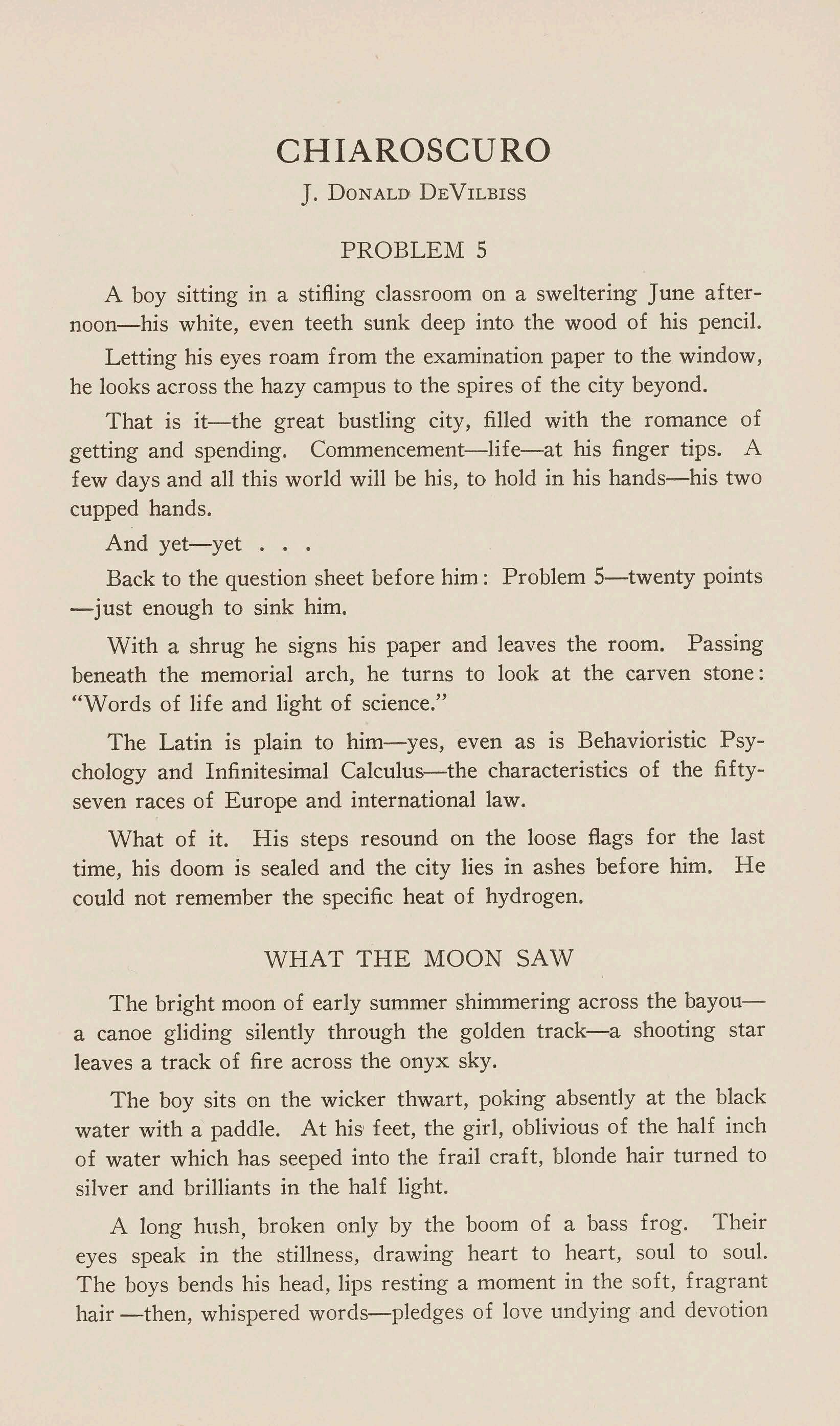
J. DONALD DEVILBISS
A boy sitting in a stifling classroom on a sweltering June afternoon-his white, even teeth sunk deep into the wood of his pencil. Letting his eyes roam from the examination paper to the window, he looks across the hazy campus to the spires of the city beyond.
That is it-the great bustling city, filled with the romance of getting and spending. Commencement-life-at his finger tips. A few days and all this world will be his, to hold in his hands-his two cupped hands.
And yet-yet ...
Back to the question sheet before him : Problem 5-twenty points -just enough to sink him.
With a shrug he signs his paper and leaves the room. Passing beneath the memorial arch, he turns to look at the carven stone: "Words of life and light of science."
The Latin is plain to him-yes, even as is Behavioristic Psychology and Infinitesimal Calculus-the characteristics of the fiftyseven races of Europe and international law.
What of it. His steps resound on the loose flags for the last time, his doom is sealed and the city lies in ashes before him. He could not remember the specific heat of hydrogen.
The bright moon of early summer shimmering across the bayoua canoe gliding silently through the golden track-a shooting star leaves a track of fire across the onyx sky.
The boy sits on the wicker thwart, poking absently at the black water with a paddle. At hiS' feet, the girl, oblivious of the half inch of water which has seeped into the frail craft, blonde hair turned to silver and brilliants in the half light.
A long hush, broken only by the boom of a bass frog . Their eyes speak in the stillness, drawing heart to heart, soul to soul. The boys bends his head, lips resting a moment in the soft, fragrant hair -then, whispered words-pledges of love undying and devoti on
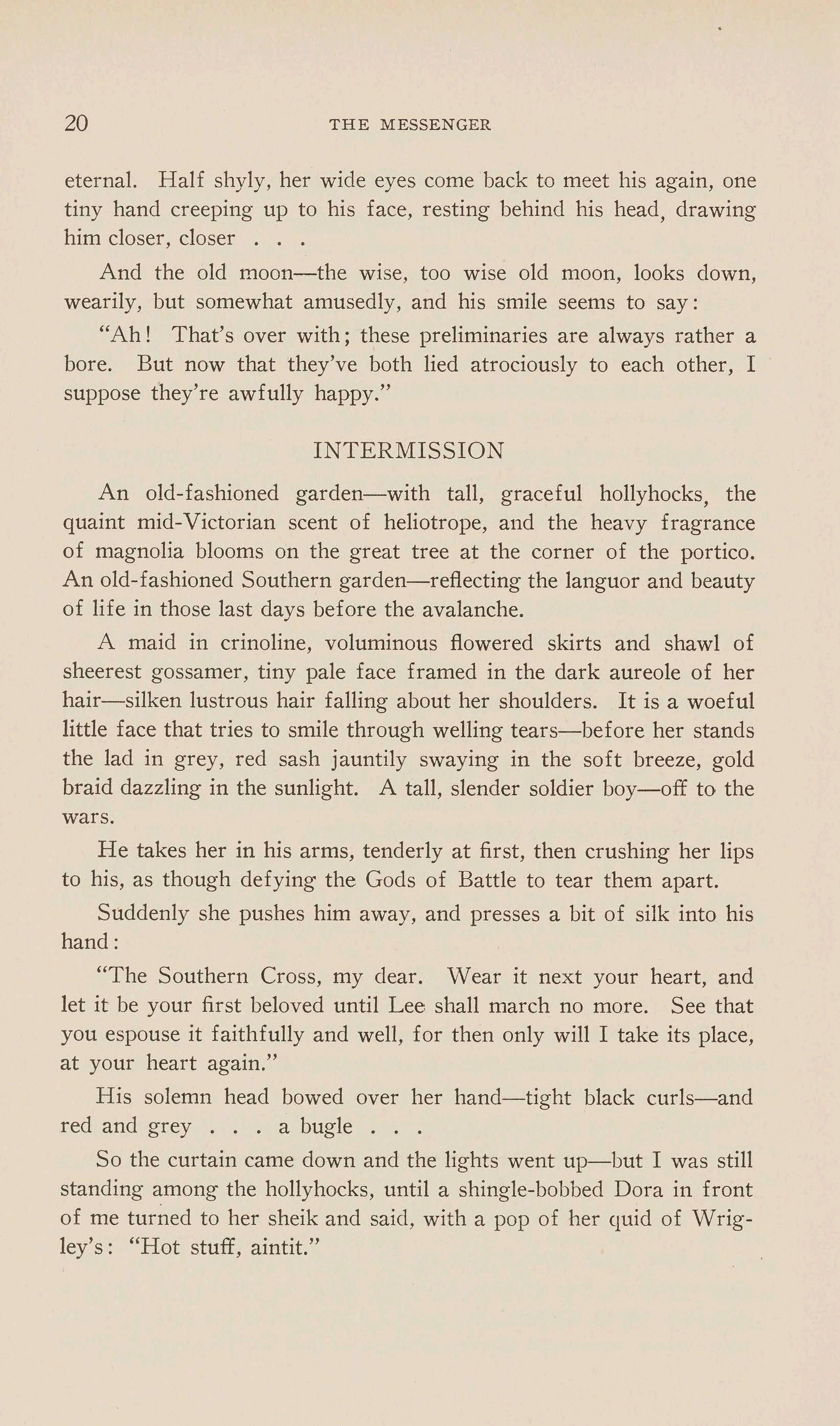
eternal. Half shyly, her wide eyes come back to meet his again, one tiny hand creeping up to his face, resting behind his head, drawing him closer, closer . . .
And the old moon-the wise, too wise old moon, looks down, wearily, but somewhat amusedly, and his smile seems to say:
"Ah! That's over with; these preliminaries are always rather a bore. But now that they've both lied atrociously to each other, I suppose they're awfully happy."
An old-fashioned garden-with tall, graceful hollyhocks, the quaint mid-Victorian scent of heliotrope, and the heavy fragrance of magnolia blooms on the great tree at the corner of the portico. An old-fashioned Southern garden-reflecting the languor and beauty of life in those last days before the avalanche.
A maid in crinoline, voluminous flowered skirts and shawl of sheerest gossamer, tiny pale face framed in the dark aureole of her hair-silken lustrous hair falling about her shoulders. It is a woeful little face that tries to smile through welling tears-before her stands the lad in grey, red sash jauntily swaying in the soft breeze, gold braid dazzling in the sunlight. A tall, slender soldier boy-off to the wars.
He takes her in his arms, tenderly at first, then crushing her lips to his, as though defying the Gods of Battle to tear them apart. Suddenly she pushes him away, and presses a bit of silk into his hand:
"The Southern Cross, my clear. Wear it next your heart, and let it be your first beloved until Lee shall march no more. See that you espouse it faithfully and well, for then only will I take its place, at your heart again."
His solemn head bowed over her hand-tight black curls-and red and grey . . . a bugle . . .
So the curtain came down and the lights went up-but I was still standing among the hollyhocks, until a shingle-bobbed Dora in front of me tur~ed to her sheik and said, with a pop of her quid of Wrigley's: "Hot stuff, aintit."
Editor's Note: Mr. Whoosis, who was forced to relinquish his studies in Richmond College several years ago, because of ill h ealth, is now convalescing at the home of a friend in Albemarle County. Students who were acquainted with Mr. Whoosis will be pleased to l earn that his present condition is very encouraging.
Walnut Lodge
The Sixteenth
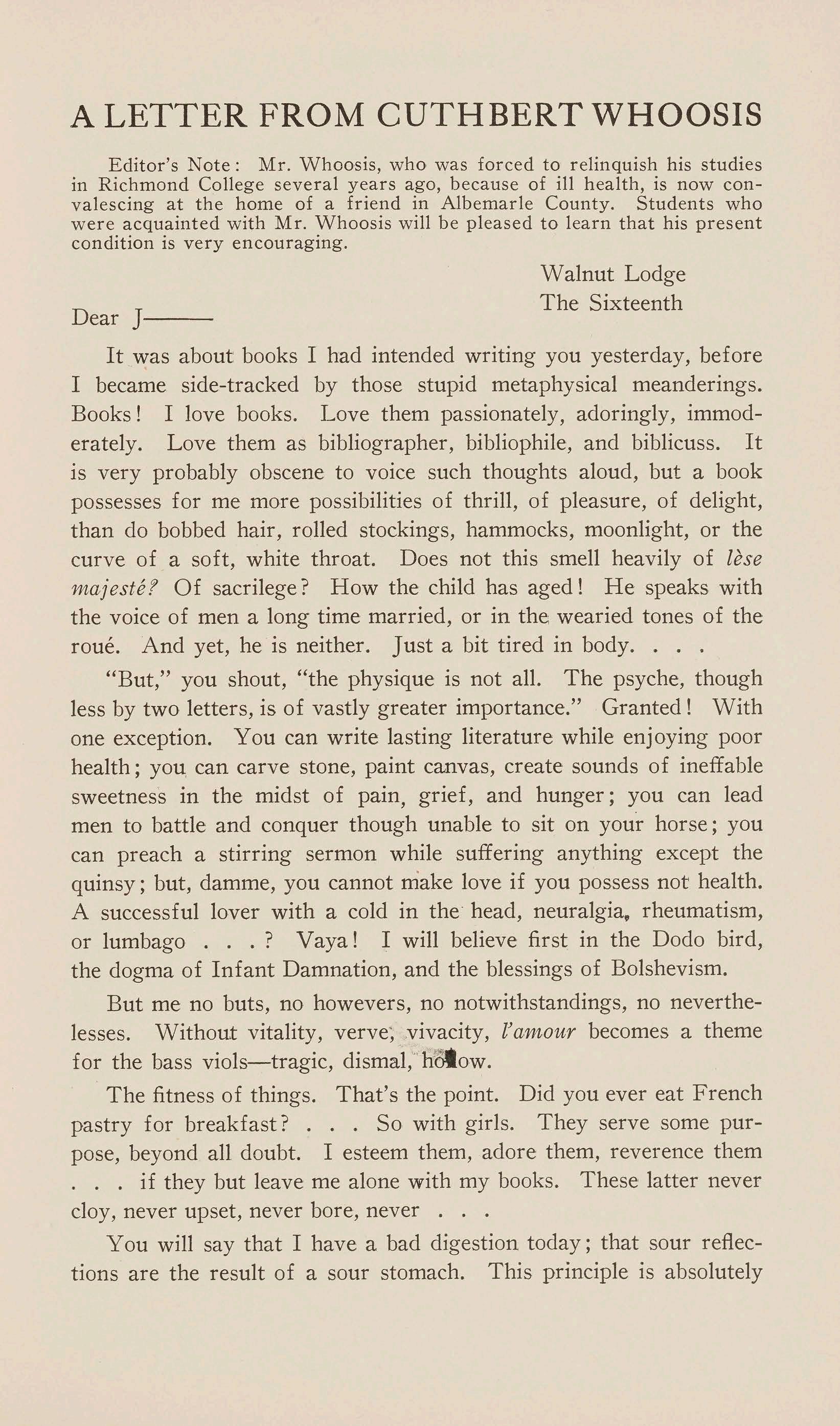
Dear J---
It was about books I had intended writing you yesterday, before I became side-tracked by those stupid metaphysical meanderings. Books! I love books. Love them passionately, adoringly, immoderately. Love them as bibliographer, bibliophile, and biblicuss. It is very probably obscene to voice such thoughts aloud, but a book possesses for me more possibilities of thrill, of pleasure, of delight, than do bobbed hair, rolled stockings, hammocks, moonlight, or the curve of a soft, white throat. Does not this smell heavily of lese majeste ? Of sacrilege? How the child has aged! He speaks with the voice of men a long time married, or in the wearied tones of the roue. And yet, he is neither. Just a bit tired in body ....
"But," you shout, "the physique is not all. The psyche, though less by two letters, is of vastly greater importance." Granted! With one exception. You can write lasting literature while enjoying poor health; you , can carve stone, paint canvas, create sounds of ineffable sweetness in the midst of pain, grief, and hunger; you can lead men to battle and conquer though unable to sit on your horse; you can preach a stirring sermon while suffering anything except the quinsy; but, damme, you cannot make love if you possess not health. A successful lover with a cold in the head, neuralgia, rheumatism, or lumbago . . . ? Vaya ! I will believe first in the Dodo bird, the dogma of Infant Damnation, and the blessings of Bolshevism .
But me no buts, no howevers, no notwithstandings, no neverthelesses. Without vitality, verve~ vivacity, l'amour becomes a theme for the bass viols-tragic, dismal, "holow.
The fitness of things. That's the point. Did you ever eat French pastry for breakfast? . . . So with girls. They serve some purpose, beyond all doubt. I esteem them, adore them, reverence them . . . if they but leave me alone with my books. These latter never cloy, never upset, never bore, never . . .
You will say that I have a bad digestion today; that sour reflections are the result of a sour stomach. This principle is absolutely

sound. I am the exception which clinches the rule. Whenever I become involved in gastronomic difficulties, whither my present state does often lead me, I become, not vitriolic, but strangely mellowed, softened, sweetened. I review tenderly, gratefully, regretfully, those toothsome creatures who once helped me "to deck with garlands of abandon my hours of leisure." (The last half of that is Byron's.)
Where am I come? My subject was books. In the manner of an after-dinner speaker I have talked of everything else. And now I drag in Byron. Two more words, and we'll get back to the papyri . . . perhaps. As Master Frarn;ois Villon used to sing, "All things except myself I know."
I would not have you think harshly of my present reactions to the leddys. I fear greatly, sir, 'tis but an outcropping of Puritanism, that fetish of fear and suppression which so ominously spreads over these Sovereign States. I am somewhat in the position of an elderly lady who gives up her third cup of coffee because it keeps her awake at nights. Or the man who finds himself unable to assimilate roast pork, and so eschews the most savory dish ever invented by civilized man. . . . To shorten this rhapsody, however, I truly believe that I have lied concerning the lassies. Unconsciously, perhaps, but outrageously, all the same. For all my love of the she-wolf's milk; for all my delight in beautiful words, lilting ideas, soft music; in spite of this driving thirst for knowledge, this ceaseless straining after ideals, this frightful discontent-regardless of all these things, I say, -did the gods but give me again the old carcass which, but a few years since roamed lightly the hills of old Westham, and exposed it to the rays of a large, yellow moon, and the soft fire of two brown eyes, with perhaps an easy wind from out a pine woods, and, far off, the strains of a Viennese waltz . . . then, where would your philosopher be, what would then become of your student of life, your fine rancier of ideals? . . . In his place would stand the usual stammering idiot.
But enough. I have rambled nowither, and what of the books? That will be for another time. Just now I enclose a slight something which you may use in the chaste pages of your academic journal. That is, of course, if it makes the grade. If it does not, have no cumpunctions about presenting it to your omnivorous wastebasket. Regards to the gang.
Yours sincere,

CUTHBERT WHOOSIS
It is Saturday night. At five minutes to twelve o'clock the musicians stop playing. One does not dance in Avallon on the Lord's Day. That is to say, one does not dance in the Club House on the Lord's Day, the Board of Governors and the vestry of our little vinecovered Episcopal church being somewhat synonomous.
A few minutes past midnight, then, a large, white moon finds us skimming over the asphalt towards the city. Alice Claire is a capable driver, albeit a bit too fond of taking sharp curves at breathless speeds. Not infrequently my heart misses a beat or two as we twist around some tall, black hedge, or flash through some darkened hamlet. I try to console myself with the thought that if one must die, nothing could be more pleasant than dying with Alice Claire. . . . It is April, and a large, white moon rides high in a cloudless sky. It would be far nicer, think I, to live with Alice Claire . . . and for Alice Claire.
As we round a sudden headland the city's lights flash up out of the valley. My fears diminish. Sanely, but swiftly, we glide through interminable rows of sleeping houses, and come to a skidding stop before the door of Alice Claire's home. A bell strikes one. . . .
It is April, and a large, white moon commands the sky. As we enter the door a bell ·strikes one. . . . There is a fire burning in the library-a large poplar log blazing in the open hearth. A divan stretches before the fire, and two slender wax tapers aid the flames in embroidering the room with delicate, quivering shadows. On a table near the divan, a percolator splutters agreeably, and the aroma of well-made coffee pervades the room. The table is a miracle of china, and linen, and silver . . . Odette is a jewel. Odette is a capable young woman from Normandy. Odette has a genius for brewing coffee. I flatter Odette shamelessly; and Odette spoils me frightfully. . . The coffee is for me. Lots and lots of it, with yellow cream and brown sugar. Alice Claire makes her usual grimace of horror; she abhors this drinking of coffee at midnight. "Ugh!" she shudders, as I help myself to more cream and take another macaroon. The macaroons are for me, too, as are also the generous sandwiches of Camenbert cheese. "Savage!" mocks Alice Claire, sinking two impeccable teeth into the gold brown softness of a Persian date. "Barbarian! Bourgeois! Baby!"
I protest violently. My taste for nocturnal nourishment may be open to question. but my choice of a dancing partner is certainly beyond reproach. Such feeble compliments do not arouse Alice Claire. She gazes intently into the fire, sipping slowly from a thin glass, filled with milk, which she holds in her hand. "It is either Odette or your stomach. It is lucky you do not come oftener. Either she must go or your digestion will."
"Which means," say I, "my digestion. · Your aunt would part . with her own stomach before losing Odette."
"But coffee at one o'clock! And macaroons! And that horrible cheese ! Faugh !"
I brazenly pour myself a third cup ( Alice Claire will have nothing to do with any but the first) and wink at Odette who has just entered to stir the fire, and snuf the candles. Odette is a jewel, and Alice Claire knows it. I flatter Odette shamelessly; Odette spoils me frightfully.

As I come down the steps and turn up the avenue, a bell in the nearby steeple strikes two. I am so wide awake, and the night is of such unusual beauty, that I decide to walk down to my hotel, a matter of several miles through quiet residential streets, and by way of a large public park. . . . The Cathedral stands just opposite one entrance to the park, and as I come up through a tree-lined path, and catch a glimpse of it standing there bathed in white moonlight, at the end of a tunnel of foliage, I hold my breath in astonishment and admiration. . . . April night; a large, round moon; the Cathedral, white, glistening, shadow-flecked at the end of a leafy tunnel. . . . I sit down upon a nearby bench and seep my soul in its beauty . . . in the night's beauty and the Cathedral's.
The acropolis by moonlight cannot be more beautiful . the shadowy patterns on the white gravel walk; the long, tree-darkened alley; the great splash of soft, silvery whiteness which is the Square, streaked with long, heavy shadows from the Cathedral . . . I think of how Alice Claire would love it. I think of Alice Claire, and suddenly I find her sitting beside me . . . sitting beside me upon the bench.
"Alice Claire!" I cry, and leap to my feet. And then I see that it is not Alice Claire. Not exactly Alice Claire. . . . She is dressed in a simple frock of soft, white stuff, and her long brown hair (Alice

Claire has long, brown hair) hangs down below her waist hangs down below her waist in two, long thick braids. It is Alice Claire.
"Alice Claire!" I cry. . . . She only smiles (like Alice Claire smiles) mischievously, irresistibly, saucily. And I see that it is not Alice Claire. And yet, they are her eyes, and her lips, and her nose. Again I am certain that it is she. "Who are you?" I ask. And then, recovering myself, my astonishment somewhat mastered, I stammer, "You must really pardon me . . . my rudeness . . . you are sb like a friend of mine. . . . "
"I know," she says, "please sit down." Her voice is like nothing I have ever heard before. It holds the beauty and the gentle richness of the white, moon-splashed Cathedral at the end of its treesheltered vista. . . .
I sit down. She moves over close to me, and smiles. Smiles mischievously, like Alice Claire smiles. She is Alice Claire. I can swear it. . . . And yet, and yet. . . . But I know it is not Alice Claire. It is all very confusing. I say nothing. There is nothing I can say. . . . And then she speaks.
"O, but I am Alice Claire. . . . And I am not Alice Claire. I am many things, an1 I am nothing. I am Youth, and I am Old Age. I am Ariel, and I am Caliban. . . " She pauses, her arms stretched wide open in front of her, in a gesture of ineffable grace. Softly she laughs. A tiny, adorable laugh, disturbingly lovely. . . . Taking my hand in one of hers-a warm, firm, little hand-she points with the other down the tree-enclosed lane. Very low, she murmurs, "I am its spirit."
I do not quite understand. "Who's spirit?" I ask.
"The Cathedral's."
"The Cathedral's?"
"Yes," patiently, "the Cathedral's." And after a pause, "but I shall tell you. I am whatever anyone may think about the Cathedral, about my Cathedral. I am its spirit. Its soul, if you like. You were thinking of Alice Claire. You were thinking of my Cathedral. And so, to you, I must be Alice Claire. . . . I am whatever any one thinks of my Cathedral. I have a form for every person, and for every thought. I am inexhaustible. I am its spirit. You cannot always see me. I am in the mind, however, of everyone who thinks of my Cathedral, and I am just what they think. If you think nice things of my home, then I appear beautiful to your mind. If you
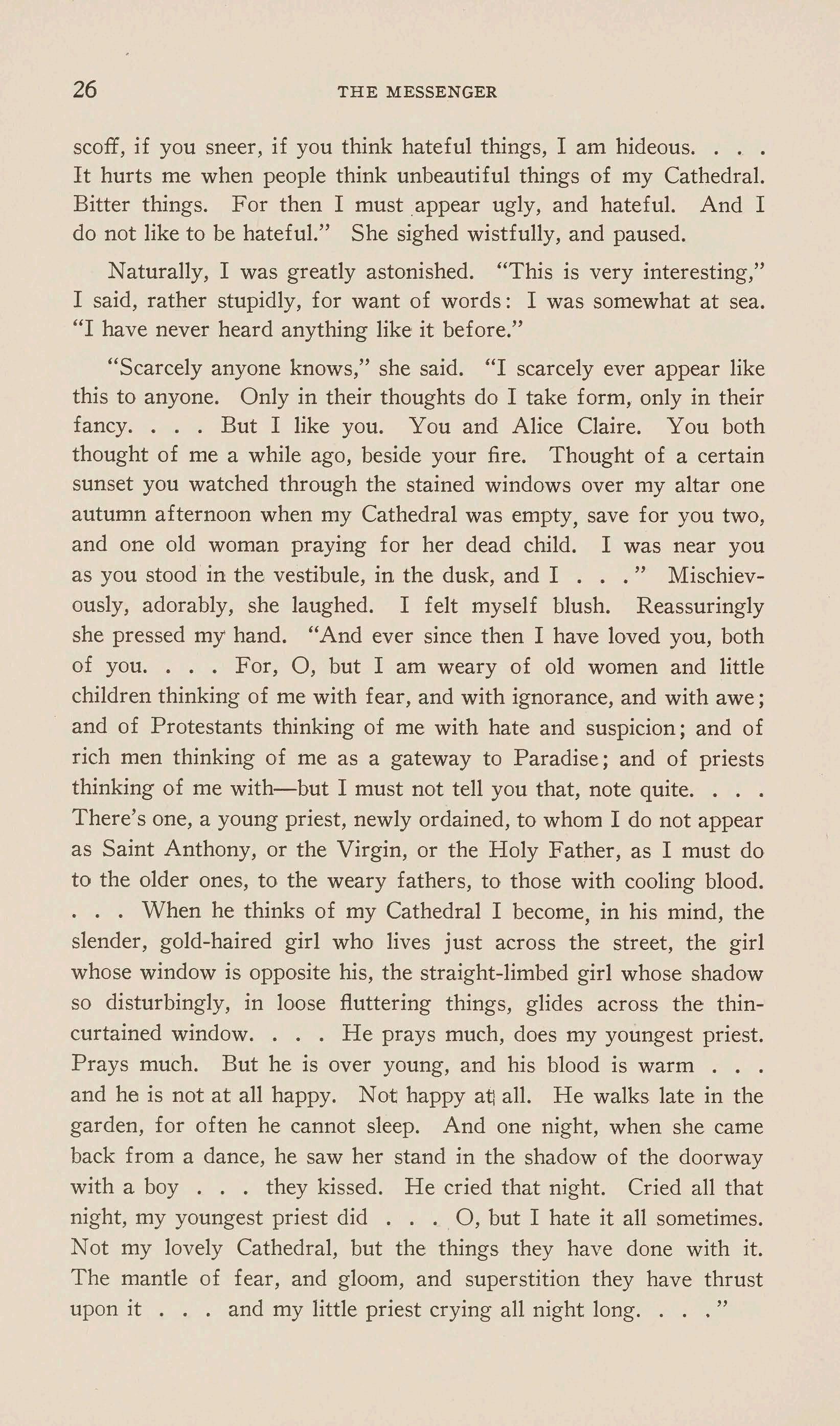
scoff, if you sneer, if you think hateful things, I am hideous. It hurts me when people think unbeautiful things of my Cathedral. Bitter things. For then I must appear ugly, and hateful. And I do not like to be hateful." She sighed wistfully, and paused.
Naturally, I was greatly astonished. "This is very interesting," I said, rather stupidly, for want of words: I was somewhat at sea. "I have never heard anything like it before."
"Scarcely anyone knows," she said. "I scarcely ever appear like this to anyone. Only in their thoughts do I take form, only in their fancy. . . . But I like you. You and Alice Claire. You both thought of me a while ago, beside your fire. Thought of a certain sunset you watched through the stained windows over my altar one autumn afternoon when my Cathedral was empty, save for you two, and one old woman praying for her dead child. I was near you as you stood in the vestibule, in the dusk, and I . . . " Mischievously, adorably, she laughed. I felt myself blush. Reassuringly she pressed my hand. "And ever since then I have loved you, both of you .... For, 0, but I am weary of old women and little children thinking of me with fear, and with ignorance, and with awe; and of Protestants thinking of me with hate and suspicion; and of rich men thinking of me as a gateway to Paradise; and of priests thinking of me with-but I must not tell you that, note quite. . . . There's one, a young priest, newly ordained, to whom I do not appear as Saint Anthony, or the Virgin, or the Holy Father, as I must do to the older ones, to the weary fathers, to those with cooling blood. . . . When he thinks of my Cathedral I become, in his mind, the slender, gold-haired girl who lives just across the street, the girl whose window is opposite his, the straight-limbed girl whose shadow so disturbingly, in loose fluttering things, glides across the thincurtained window. . . . He prays much, does my youngest priest. Prays much. But he is over young, and his blood is warm . . . and he is not at all happy. Not happy at:1all. He walks late in the garden, for often he cannot sleep. And one night, when she came back from a dance, he saw her stand in the shadow of the doorway with a boy . . . they kissed. He cried that night. Cried all that night, my youngest priest did . . . 0, but I hate it all sometimes. Not my lovely Cathedral, but the things they have done with it. The mantle of fear, and gloom, and superstition they have thrust upon it . . . and my little priest crying all night long. . . "

She was silent for a few minutes, then continued, "And the other day I had a most dreadful afternoon. For an entire hour I was obliged to assume the forms of a thousand miserable, hateful things. It was a parade. Hundreds upon hundreds of persons marched by dressed in long white robes, with tall, peaked hoods upon their heads. And, 0, the things they thought about my Cathedral . . . the things they thought about my Cathedral! It was a frightful afternoon for me. I would have had a violent headache, if I were able to have headaches. . . . " She sighed deeply.
"O, yes," I chimed in, "the Ku Klux. I saw that parade myself. . . . And they passed your Cathedral. It must have been trying upon you."
Suddenly she arose. "He's waking, he's waking, my little priest. I must go to him. In the garden he will be walking, and praying, and thinking of the gold-haired girl." She seemed to have become less distinct, and the Cathedral, down the fast-darkening alley of trees, had become greyish-white, pale. But I could not let her go, yet. A thought had been running through my head. It burst into words: "But tell me," I exclaimed, "tell me what form you take in the mind of Alice Claire when she thinks of your Cathedral. When I think of your Cathedral, you are Alice Claire to me. What are you to her when she thinks of your Cathedral?" I spoke rapidly and with little enough coherence, for she was becoming rapidly indistinguishable from the grey mist which roved about the park. The moon had hidden herself in a forest of thick clouds. "Tell me," I pleaded ...
She laughed merrily-a thin, silvery, little laugh-and was gone. And there I stood in the roadway, blinking my eyes, gazing stupidly about me. A grey mist hung over the park, and the sun's first, faint rays were battling with it. The Cathedral, no longer bathed with moonlight, was a pale, sickly grey. . . . A bell, nearby, struck five....
A cool breeze had sprung up. I had become chilled, and was shivering. I turned up my coat collar and started briskly along the pathway. As I came out into' the open place before the Cathedral, a few dark forms, hurrying down the converging streets, disappeared beneath the great portico. Old women, these-devout housewivesgoing to early mass. I was tempted to following their example, but I was chilled, and then, too, despite the macaroons and the camembert sandwiches, the night air had whipped up my appetite. I hurried

past the great doors and up the Avenue. Hurried up the Avenue . . . and stopped. Stopped suddenly-breathlessly. . . .
A covered corridor, open at both sides connects the Cathedral with the priests' house. And there, standing midway between the two, I saw him. He was looking intently across the street . . . looking intently at a window in a house across the street. His pale, handsome, young face (he could not have been thirty) was strangely alight, filled with a wealth of tenderness. . . In the window across the street, little white curtains fluttered in the morning breeze.
We made a strange pair, standing there in the dawn: he in his long black robes, his freshly shaven face lifted toward the windowI with turned up collar and evening dress peeping through halfopened coat. . . . He must have sensed my presence, for suddenly he turned . . . turned and looked at me. Looked at me strangely. Then fiercely, bitterly. . . . For a full minute we stood staring at each other. Staring strangely at each other in the dawn. .
And into his eyes crept a terrible longing, like one sees at times in the eyes of caged, wild! things. His fists doubled. He seemed as if to speak. Then, silently, he crossed himself, and walked slowly along the corridor into the Cathedral.
I stood there a moment gazing at the door through which he had passed. And then, at the little white curtains fluttering in the window across the street. . . . I thought of him, there inside, saying mass. I thought of the old women-'-the devout housewivesto whom he would reveal the Holy Sacrament. The devout, old housewives to whom it would be the sacrifice of Christ's body when the symbolic bread broke between his strong, young hands those strong, warm, young hands which were not a symbol, but a real part of the real sacrifice. . . .
A burst of sunlight broke through the weakening mists and, hurrying down the Avenue, I could not but thank God-as Stevenson once did-that I was free to live . . . and free to love.
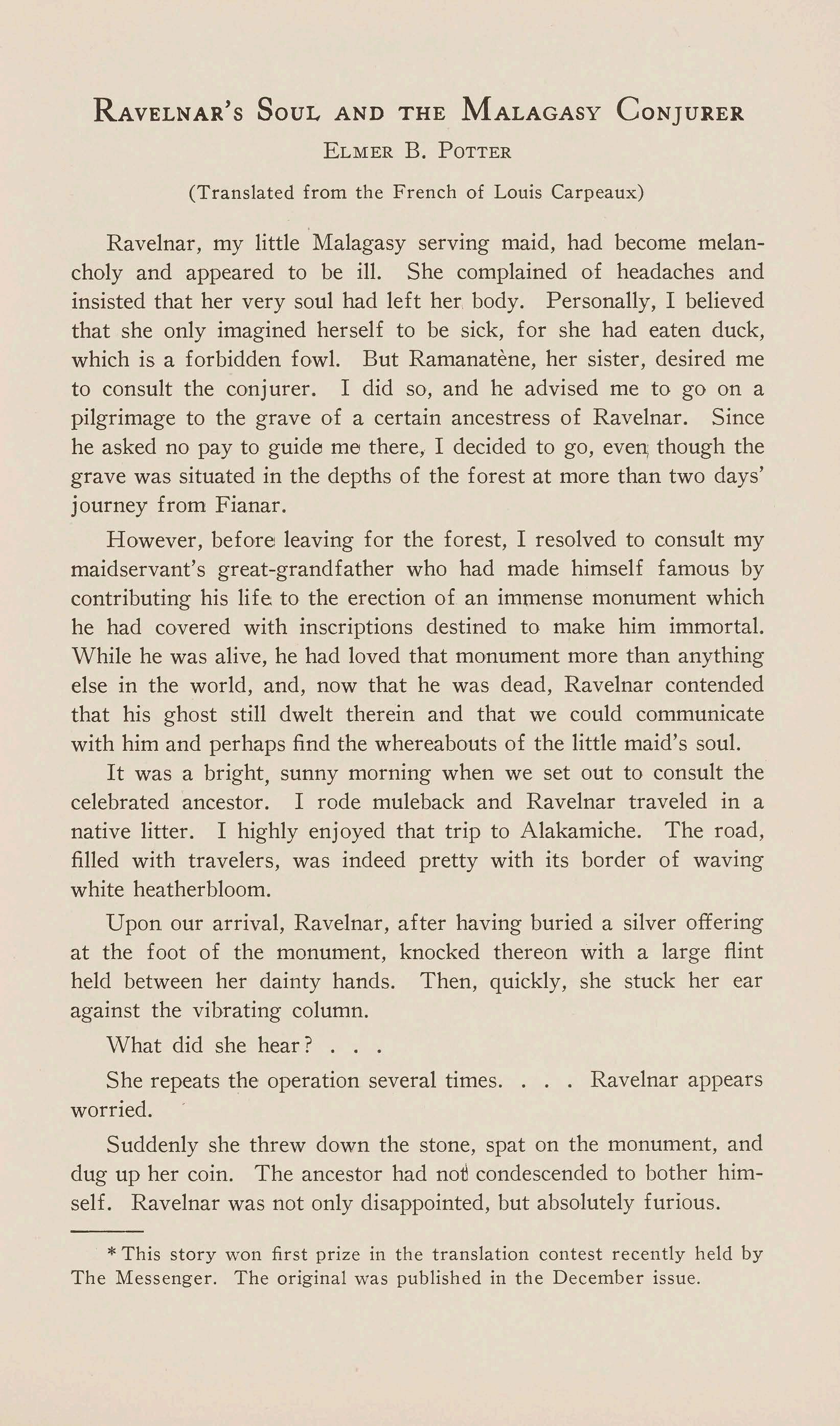
ELMER B. POTTER
(Translated from the French of Louis Carpeaux)
Ravelnar, my little Malagasy serving maid, had become melancholy and appeared to be ill. She complained of headaches and insisted that her very soul had left her . body. Personally, I believed that she only imagined herself to be sick, for she had eaten duck, which is a forbidden fowl. But Ramanatene, her sister, desired me to consult the conjurer. I did so, and he advised me to go on a pilgrimage to the grave of a certain ancestress of Ravelnar. Since he asked no pay to guide me there, I decided to go, even; though the grave was situated in the depths of the forest at more than two days' journey from Fianar.
However, before leaving for the forest, I resolved to consult my maidservant's great-grandfather who had made himself famous by contributing his life to the erection of an immense monument which he had covered with inscriptions destined to make him immortal. While he was alive, he had loved that monument more than anything else in the world, and, now that he was dead, Ravelnar contended that his ghost still dwelt therein and that we could communicate with him and perhaps find the whereabouts of the little maid's soul. It was a bright, sunny morning when we set out to consult the celebrated ancestor. I rode muleback and Ravelnar traveled in a native litter. I highly enjoyed that trip to Alakamiche. The road, filled with travelers, was indeed pretty with its border of waving white heatherbloom.
Upon our arrival, Ravelnar, after having buried a silver offering at the foot of the monument, knocked thereon with a large flint held between her dainty hands. Then, quickly, she stuck her ear against the vibrating column.
What did she hear? . . .
She repeats the operation several times . . . Ravelnar appears worried.
Suddenly she threw down the stone, spat on the monument, and dug up her coin. The ancestor had norl condescended to bother himself. Ravelnar was not only disappointed, but absolutely furious.
* This story won first prize in the translation contest recently held by The Messenger. The original was published in the December issue

It was then that I conceived the idea of forcing the ancestor to respond. Following the Malagasy custom in such cases, I took five stones and, one by one, tossed them on top of the huge pillar. Three rested on the summit: the ancestor had spoken. It was an order to go. I decided, therefore, to immediately set out for the forest where rested the remains of Ravelnar's great-grandmother who had, during her lifetime, occupied an important position at the court of the queens of Tananarive.
The conjurer had offered to conduct me to the abode of the ancestral soul, but, when the time came for departure, he required me to slay a bull whose shade was to accompany us and assure us a good reception. That was hard on me, for , it was just at the end of the month, and I had little left to spend on the soul of my "ramatou." At last, however, I came across a bargain, a young bull for sixty francs, which I sacrificed, and upon which the conjurer, eating purses and shades, £easted for several days.
Before my departure, Ramanatene, my young friend's sister, fearing that my soul, also, might be stolen, desired, as an added protection for me, that I become her blood brother. We, therefore, with the frightful conjurer as witness, went through the ceremony of drinking a tiny drop of each other's blood which we had scratched from our breasts. Thenceforth, each of us owned half the other. All we possessed-even our money-became our common property ! Ramanatene, in addition, was to give me half her soul should mine be stolen in the forest.
Reassured and happy with being blood brother of the pretty Ramanatene, I le£t one morning in the ruddy glow of the rising sun in search of the ancestral soul. That search was no easy matter. The grave, forgotten for years, was far from any path in the depths of the forest.
In the dense entanglement of vegetation, we opened with great difficulty a passage, or more exactly a tunnel. We tramped on a damp, elastic cushion formed of decayed vegetable matter such as twigs, branches, and entire trees in a state of decomposition. High grass, closely interwoven tropical creepers, and bamboos guard the access to those mysterious places in nature where life and death struggle in perpetual rebirth.
When, at last, we emerged on a clearing, we were as delighted at seeing daylight as a thirsty caravan to perceive an oasis in the distance.

The dead silence of the forest was broken only by the droning of bees industriously buzzing to and from their hives of bark in the tops of the tall trees, the mournful screech of the babakoute imitating the throaty rattle of a dying man, or the woodfrog uttering his strange croaking which sounds much like an axe chopping on a hollow tree.
Thus we proceeded through the dim light, the vegetation becoming denser and denser. Before us went the conjurer; his noise-loving soul starved by the silence, he frequently made a bamboo resound with his blows. Ravelnar stuck close by my side somewhat frightened by the profound mystery of this abode of the shadows.
At last we reached our destination!
Close by a gurgling brooklet that was spangled with silver by the rays of the sun, we found a little mound almost hidden by the immense arboreal ferns which encompassed it. Here the ancestress had rested for two centuries. Repudiated, exiled, she had fled to Fianar where she died of leprosy, hence even in death she must suffer exile, she must repose throughout eternity in this place of solitude and yet of grandeur. I was moved, profoundly impressed.
Meanwhile, the conjurer had prepared his charms: a plateful of honeyed rice placed in a covered basket. To better entice the greedy spirit, in the corner of the basket the conjurer had displayed some honey on a banana leaf. Having finished these preparations, he began abusing the heavens to arouse and attract his soul.
A great silence followed his imprecations.
Crouched at the foot of a gigantic fern whose lacy leaves caressed my cheek, with Ravelnar trembling at my side, I listened, thoughtful and enraptured to the rustling of the bamboos, the whispering of the banana trees, the sighing of the slender ferns. The presence of the soul of the ancestress seems to render the landscape profoundly mysterious. Little wonder that I was not surprised when I saw the conjurer trace something in the air which meant nothing to me, the uninitiated.
"My soul, there is my soul!" murmurs Ravelnar in ecstasy.
"How does it look?" I ask in a low voice.
"Quite white, in the form of a, winged heart."
Suddenly the conjurer bounded to the basket and clapped on the cover which he pressed down with all his strength. He shrieked sacred words, incomprehensible to Ravelnar and me.
The soul of my maidservant is a prisoner. Under his arm the conjurer carries it in triumph.
We followed him back to Fianar. There, in my house, a regular feast of ; beef, rice, and other dishes had been prepared. There was food and drink for all.
At dessert the conjurer demanded silence. In the midst of general quietude he opened the basket gently, very gently. The soul was no longer visible-closely combined with the rice, no doubt. In a flash, Ravelnar had gulped down the contents of the dish-and with it, her own soul which it contained.
Since then, she has lost her soul no more,-fortunately for me!

The Southern breezes kiss the budding rose, And whispering a message that they bring, Impart the pleasant warmness of the spring, Until at last, the perfect blossom blows. A crimson blush upon each petal shows The flower has felt remorse's spiteful sting, At having thus acknowledged as her king, A fickle wind that quickly comes and goes.
To you, I long to bring an age old truth; You have no need to blush and drop your glance; Though I'm a breeze fresh from the fields of youth, And you're the budding flower of all Romance, The wind's kiss to the rose gives ' us a signWhy should you now draw back, in fear, from mine?

"Hey, there, nigger! What you <loin' stealin' my peaches? Want me to kill you ?"
"N-n-no, sir, please," quavered the culprit. "Ah ain't ready to die, sir."
"Well, I'll let you live this time," the old gentleman laughed, "providing you don't steal any more peaches."
"Yes, sir," the pickaninny grinned.
The accuser rode on his way in his rickety old buggy. "G'wan, Nancy," he shouted to the horse, and was gone.
The little negro watched him well out of sight; then turned back to the peach tree, laden with tempting fruit.
"This ain't stealin', nohow," he chuckled to himself, "'cause the kun'l done seed me and he knows them peaches has a callifying effect on me."
* * * * * * *
It is mid-summer.
As "Nancy" jogs you over the bumpy roads, take a look at the "kun'l." You will find much in him that is striking. In his white linen suit and white Panama hat and with his white hair and closely cut white mustache he presents a figure full of commanding dignity; you notice immediately , that he is tall and thin and that he sits quite erect. In his face, you are drawn first by his straight and wellproportioned nose, that feature in which he stores great pride. He has even been known to remark that he had three vanities: his perfect nose, his per£ ect foot, and his perfect hand. And yet, you don't consider him an egotist; he has an altogether too magnetic and lovable personality. As your gaze leads upward, you wonder how any one would ever screw up courage to oppose him; surely, those heavy eyebrows show a severe trend of mind. But, no ; he looks at you and brings such a happy twinkle into his bright, blue eyes that it can now be understood why Abed-Nego Lyons was so quick to return to his stolen pleasures. You are now struck with his long, slender hands and feet; he wears grey gloves and highly-polished black shoes. If you should ask him the reason for the gloves, and also for the
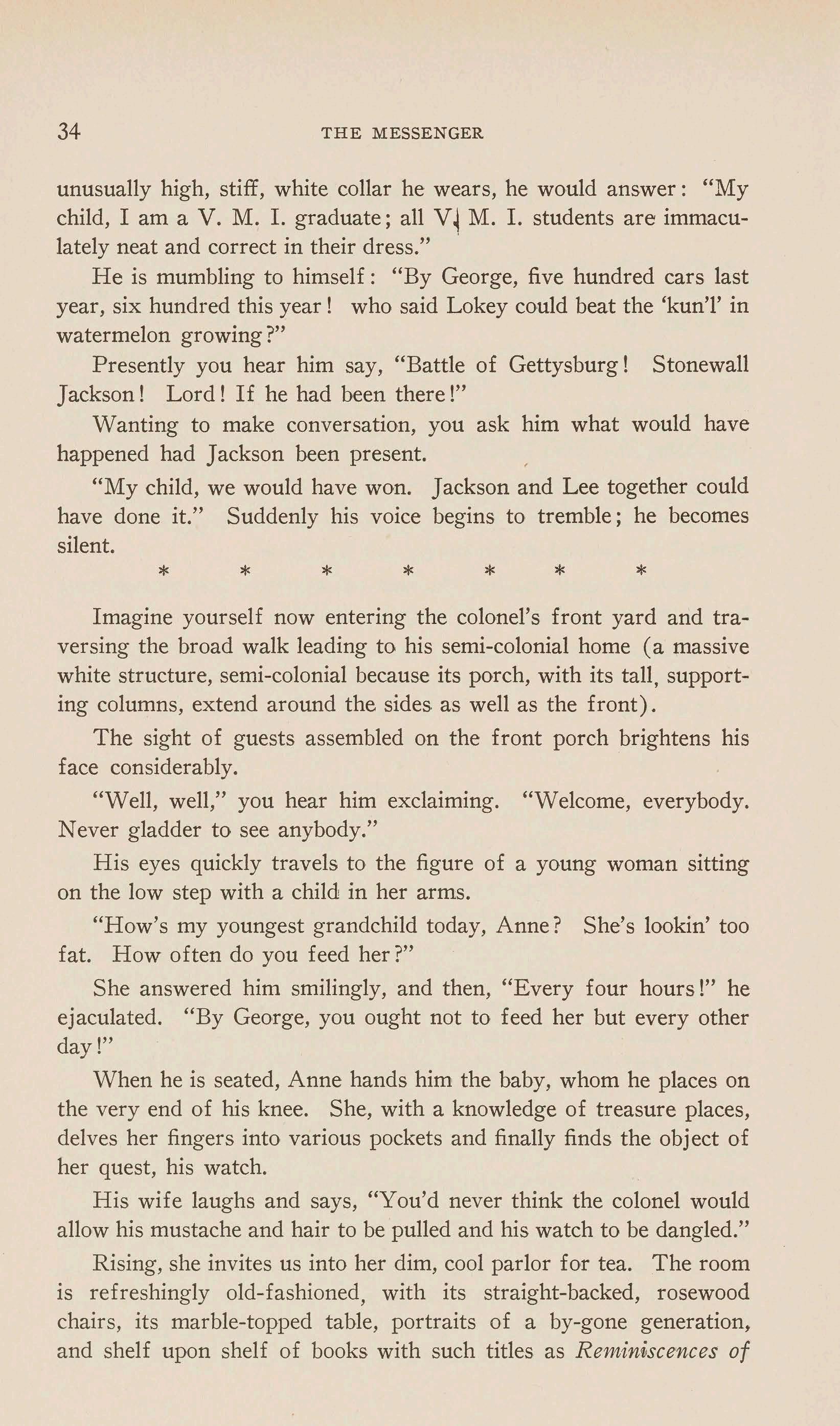
unusually high, stiff, white collar he wears, he would answer: "My child, I am a V. M. I. graduate; all V • M. I. students are immaculately neat and correct in their dress." ·
He is mumbling to himself: "By George, five hundred cars last year, six hundred this year! who said Lokey could beat the 'kun'l' in watermelon growing?"
Presently you hear him say, "Battle of Gettysburg! Stonewall Jackson! Lord ! If he had been there!"
Wanting to make conversation, you ask him what would have happened had Jackson been present.
"My child, we would have won. Jackson and Lee together could have done it." Suddenly his voice begins to tremble; he becomes silent * * * *
Imagine yourself now entering the colonel's front yard and traversing the broad walk leading to his semi-colonial home ( a massive white structure, semi-colonial because its porch, with its tall, supporting columns, extend around the sides as well as the front).
The sight of guests assembled on the front porch brightens his face considerably.
"Well, well," you hear him exclaiming. "Welcome, everybody. Never gladder to see anybody."
His eyes quickly travels to the figure of a young woman sitting on the low step with a child in her arms.
"How's my youngest grandchild today, Anne? She's lookin' too fat. How often do you feed her?"
She answered him smilingly, and then, "Every four hours!" he ejaculated. "By George, you ought not to feed her but every other day!"
When he is seated, Anne hands him the baby, whom he places on the very end of his knee. She, with a knowledge of treasure places, delves her fingers into various pockets and finally finds the object of her quest, his watch.
His wife laughs and says, "You'd never think the colonel would allow his mustache and hair to be pulled and his watch to be dangled."
Rising, she invites us into her dim, cool parlor for tea. The room is refreshingly old-fashioned, with its straight-backed, rosewood chairs, its marble-topped table, portraits of a by-gone generation, and shelf upon shelf of books with such titles as Reminiscences of
General John B. Gordon, Four Years Under Marse Robert, From the Rapidan to Richmond. Books on more modern subjects, historic and scientific also are there.
Outside, on the porch, you hear the colonel and his friends "reminiscing" at).d making , merry with mintJ juleps.
You hear him saying, "Wait a minute, there, Kendall. You talk too much. But let me tell you about the time I was the man of the People's Party. By George! At that convention at St. Louis in '93 the people literally carried me around on their shoulders."
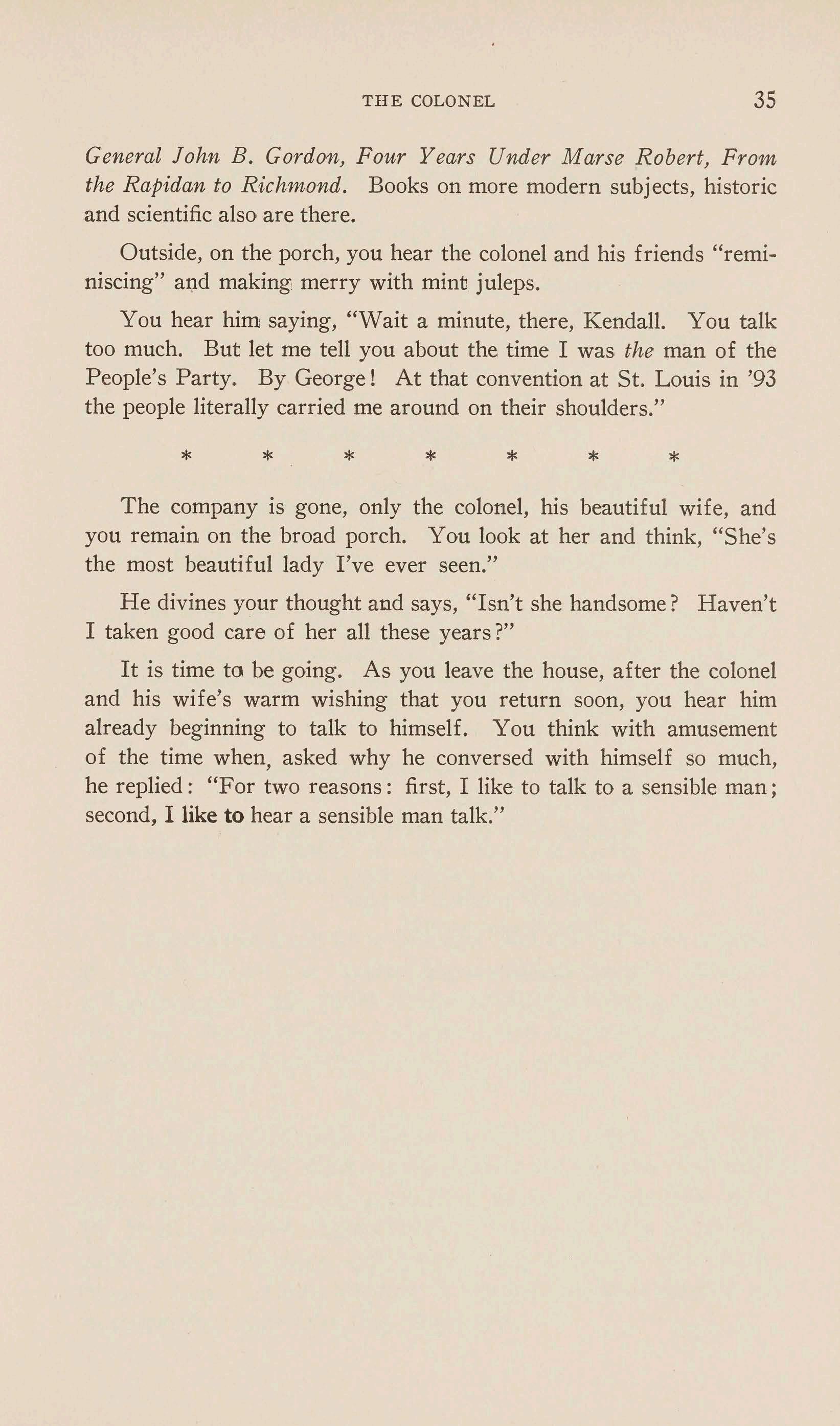
The company is gone, only the colonel, his beautiful wife, and you remain on the broad porch. You look at her and think, "She's the most beautiful lady I've ever seen."
He divines your thought and says, "Isn't she handsome? Haven't I taken good care of her all these years?"
It is time to be going. As you leave the house, after the colonel and his wife's warm wishing that you return soon, you hear him already beginning to talk to himself. You think with amusement of the time when, asked why he conversed with himself so much, he replied: "For two reasons: first, I like to talk to a sensible man; second, I like to hear a sensible man talk."
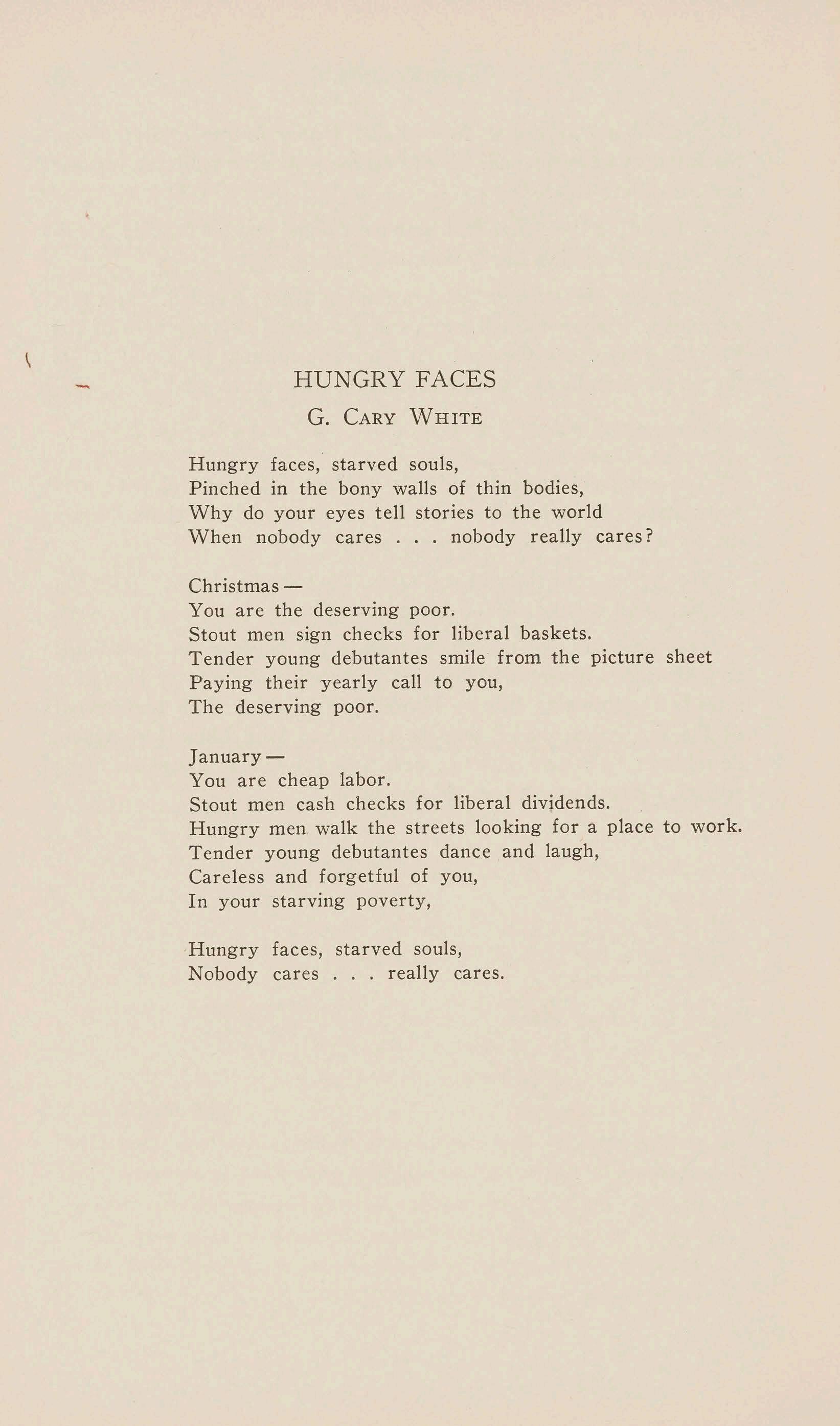
Hungry faces, starved souls, Pinched in the bony walls of thin bodies, Why do your eyes tell stories to the world When nobody cares . . . nobody really cares?
Christmas-
You are the deserving poor. Stout men sign checks for liberal baskets. Tender young debutantes smile from the picture sheet Paying their yearly call to you, The deserving poor.
January-
You are cheap labor. Stout men cash checks for liberal dividends. Hungry men walk the streets looking for a place to work. Tender young debutantes dance and laugh, Careless and forgetful of you, In your starving poverty,
Hungry faces, starved souls, Nobody cares . . . really cares.
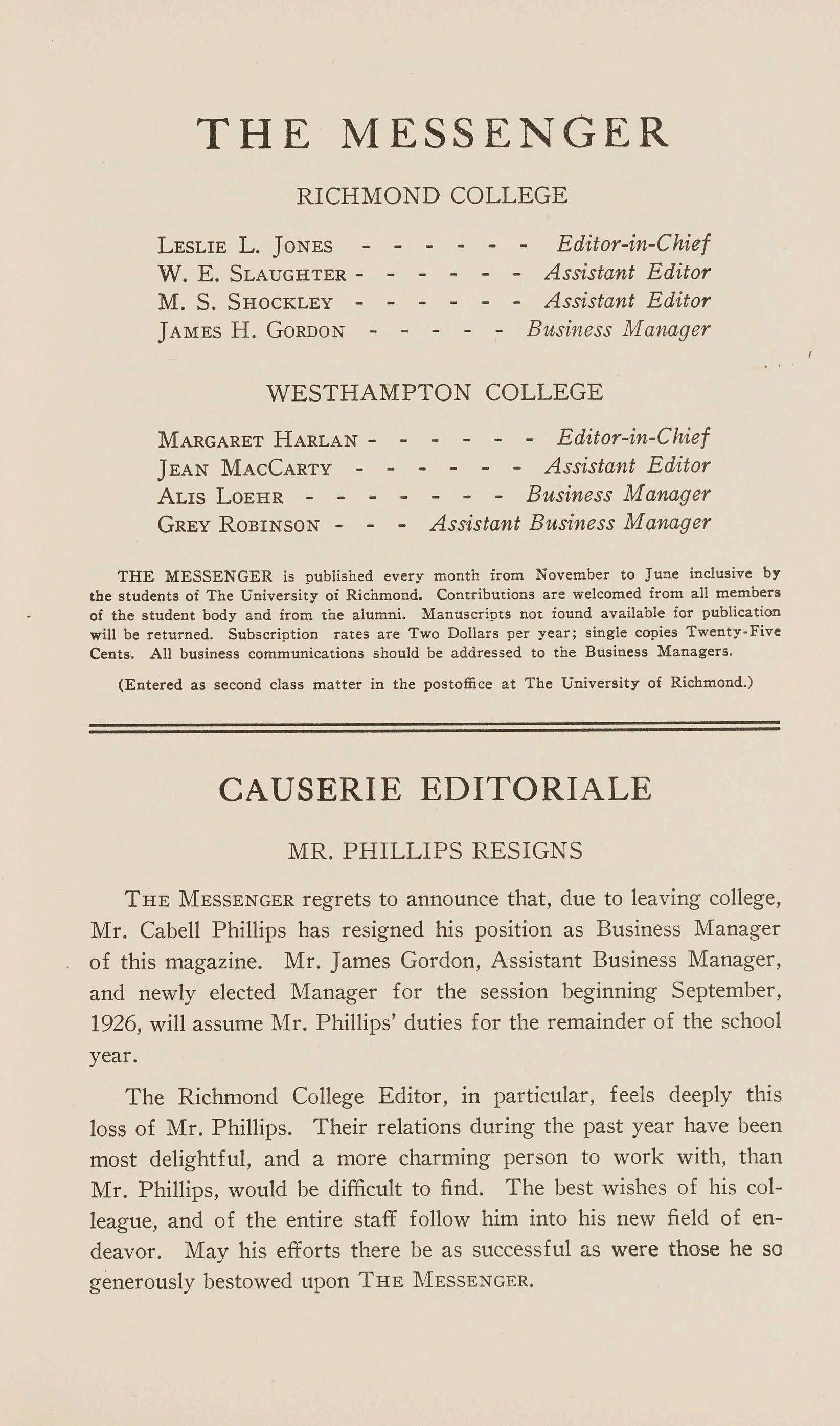
LESLIE L. JONES -- - Editor-in-Chief
w. E. SLAUGHTER-- -- Assistant Editor
M. S. SHOCKLEY ------ Assistant Editor
JAMES H. GORDON --- Business Manager
MARGARETHARLAN------ Editor-in-Chief
JEAN MAcCARTY ------ Assistant Editor
ALIS LOEHR ----- Business Manager
GREYROBINSON--- Assistant Business Manager
THE MESSENGER is publishedeverymonthfrom Novemberto June inclusiveby the studentsof TheUniversityoi Richmond.Contributionsare welcomedfromall members of the studentbodyand fromthe alumni.Manuscriptsnot foundavailableior publication willbe returned.Subscriptionrates are TwoDollarsper year; singlecopiesTwenty-Five Cents. All businesscommunicationsshouldbe addressedto the BusinessManagers.
(Enteredas secondclassmatterin the postofficeat The Universityof Richmond.)
THE MESSENGERregrets to announce that, due to leaving college, Mr. Cabell Phillips has resigned his position as Business Manager of this magazine. Mr. James Gordon, Assistant Business Manager, and newly elected Manager for the session beginning September, 1926, will assume Mr. Phillips' duties for the remainder of the school year.
The Richmond College Editor, in particular, feels deeply this loss of Mr. Phillips. Their relations during the past year have been most delightful, and a more charming person to work with, than Mr. Phillips, would be difficult to find. The best wishes of his colleague, and of the entire staff follow him into his new field of endeavor. May his efforts there be as successful as were those he so generously bestowed upon THE MESSENGER.

That was a strange four against the south wall, all in the same cast grey. There was a torso of Psyche, expression of all the learning; all the grace of scalpel, and the glory of marble columns which was Greece. There also, beside her, a head of Cleopatra, from Naples, moulded as if by the mild lapping of emerald Nile waves against the sides of an amber barge, seemed to breath the spices of Egypt. The laughing Bacchi at her side would say that the Psyche is cold-there is no light of love in her down turned eyes-her breasts lack the fullness of beauty. The other head-so the Bacchic youth would say-is full like a rose and graced in features which are warm with living. The head of Plato-perched high on its bracket-would tell us that Psyche with her delicate face expresses refinement of mind and the glory of soul. And her body-he would say-has in it the cardinal virtues: wisdoni, in the well-formed mouth, courage in the firm chin, justice in the broad brow, and in the restrained curves of her body, self-control. Voluptous, he would call Cleopatra, and artificial-from the regular wave of her neatly groomed head to the coquetish glance of her eyes.
So there would be Psyche and Plato on the one hand and Cleopatra with the Bacchi on the other and a great space between them. They would differ and discuss-Plato and the Bacchi-and neither would ever see the other's side of the question. Whatever Plato said of virtue would bore the Bacchi, and whatever the Bacchi told of beauty would annoy Plato, and neither would ever see the good in the other. Perhaps it would be the poet who could find the only real solution. And he would say-as said the poet of young Marco Polo-that it was neither one nor the other, but . . . "the great lady was too much of the mind, and the little gown-maker was too much of the body, either of them, to be pleasing young M area on that first night of spring."
For it seems that it is the poet who must fill the space between. He with the gift of seeing beauty must bring the two together, since he that has not the gift looks too long at the Psyche or admires too well the Nile Lady. He that writes well and forever takes the best from each and makes it fit well together-with restraint he tells of Cleopatra and with beauty he describes the Psyche. Perhaps he knows that reason without beauty is barren, and beauty without virtue is blatant. But, then, there is no pleasing of the philosophers nor those in the Bacchic Procession with the same thing-some will want
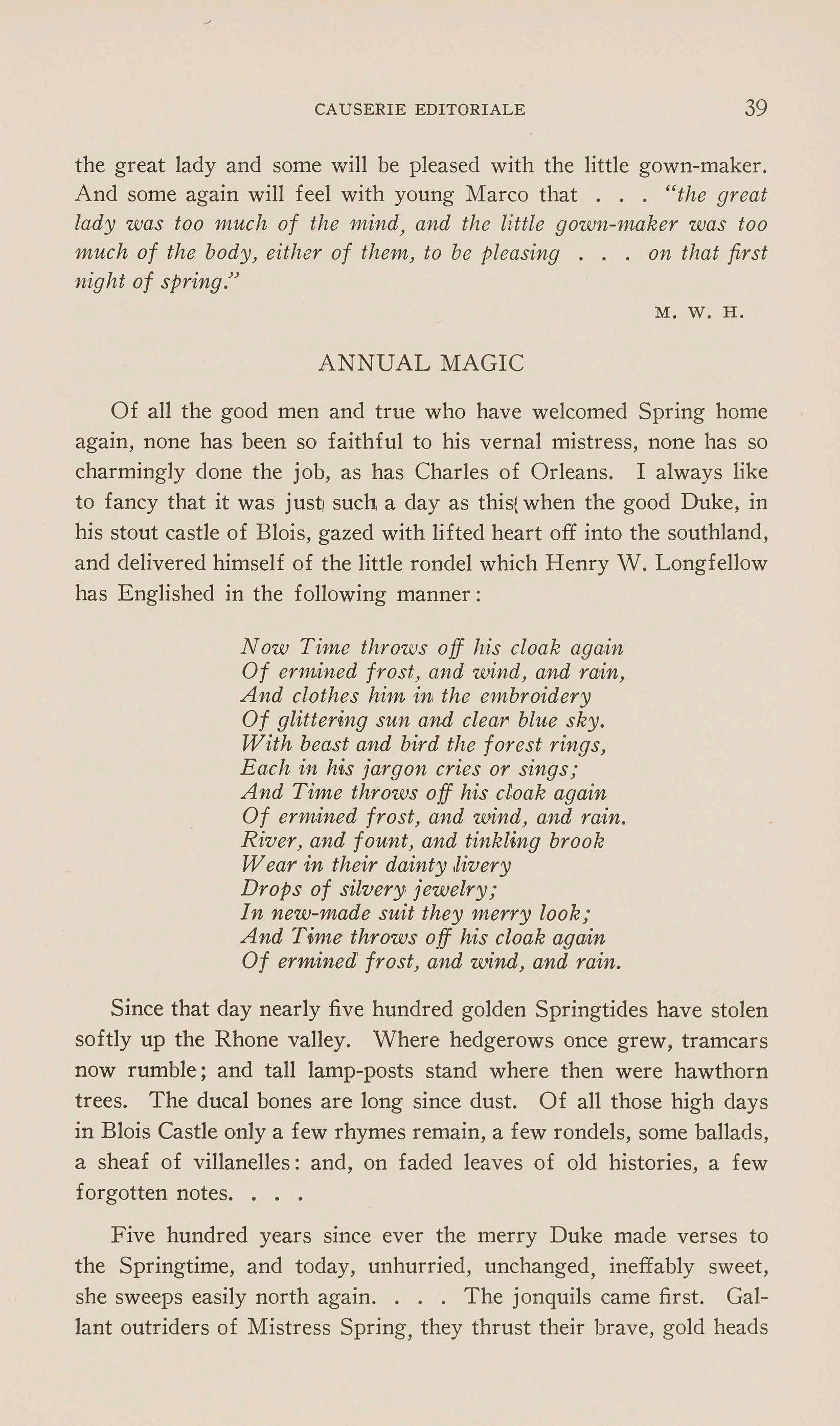
the great lady and some will be pleased with the little gown-maker. And some again will feel with young Marco that . . . "the great lady was too much of the mind, and the little gown-maker was too much of the body, either of them, to be pleasing on that first night of spring."
W. H.
Of all the good men and true who have welcomed Spring home again, none has been so faithful to his vernal mistress, none has so charmingly done the job, as has Charles of Orleans. I always like to fancy that it was justi such a day as this( when the good Duke, in his stout castle of Blois, gazed with lifted heart off into the southland, and delivered himself of the little rondel which Henry W. Longfellow has Englished in the following manner :
Now Time throws off his cloak again Of ermined frost, and wind, and rain, And clothes him in the embroidery Of glittering sun and clear blue sky. With beast and bird the forest rings, Each in his jargon cries or sings; And Time throws off his cloak again Of ermined frost, and wind, and rain. River, and fount, and tinkling brook Wear in their dainty ,livery Drops of silvery jewelry; In new-made suit they merry look; And Time throws off his cloak again Of ermined frost, and wind, and rain.
Since that day nearly five hundred golden Springtides have stolen softly up the Rhone valley. Where hedgerows once grew, tramcars now rumble; and tall lamp-posts stand where then were hawthorn trees. The ducal bones are long since dust. Of all those high days in Blois Castle only a few rhymes remain, a few rondels, some ballads, a sheaf of villanelles: and, on faded leaves of old histories, a few forgotten notes. . . .
Five hundred years smce ever the merry Duke made verses to the Springtime, and today, unhurried, unchanged, ineffably sweet, she sweeps easily north again. . . . The jonquils came first. Gallant outriders of Mistress Spring, they thrust their brave, gold heads

into the latest faltering frosts. And last Sunday, by the road's edge, I met a violet. A shy, purple violet. It seems that they are incurably shy, these violets. At least the poets say so, and all the ancient proverbs. But this one had reason to flutter: s.he was quite alone.
And this week, from out my upper window, I watch the supports come up. It is April. The first week of April. Three curious, straggling bushes turn yellow in a single night. A pink hyacinth springs here; there, one of old rose. Yonder, some anxious slender narcissi. And then, a sudden troop of proud white hyacinths. White hyacinths, of which the prophet said: "If I had but two loaves of bread, I would sell one, and buy white hyacinths to feed my soul."
Against the dark, green woods which border the southern slope, a pear tree stands up, full-blossomed, tall, and shapely, like the flame of a quiet candle. And all this week, a new moon . . . a little, white, new moon to light Spring home again.
But these are only visual impressions-kisses for weary eyes. Other channels, too, import their message. . . . There are breezes, little southeastern breezes, to fondle one's cheek. For hungry nostrils there is the scent of white clover. To friendly ears comes small pipings of forward birds. . . . Thus are the senses served. Except taste! you say. Aye, and taste, too. For this morning, mon ami, did not the milk savor delicately, faintly, exquisitely, of tender, green . ? omons ....
L. J.
There are times, our morale being at low ebb, when we fervently wish it were possible (paraphrasing Honest Abe) "to please all the people all the time." The possibility of achieving this, we are well aware, is nil. The dangers of attempting such a feat was vividly brought to our attention when we were very young by the intriguing little Aesopian fable of "The Miller, His Son, and His Ass." Therefore, we merely take it all out in mild wishing. In real practice, we take such opuses as are tossed or dragged within reach of the editorial claws, select those which do least offense to Truth, and Art, and Beauty ( with an eye ever to the fact that the greater number of our customers are not interested in high literary endeavor either from a creative or consuming standpoint) and then, quite simply, clothe them in the most comely typographical frock that the old strong box will stand. The real struggle, of course, is to get
the editorial talons upon practicable or feasible opuses. Into this mystery, however, we will not at present delve. The Gentle Reader is referred to page 51 of THE MESSENGERfor April, 1925.
And now that all hands at home have had their say, during the past year, concerning our own magazine, we display, below, opinions on the same subject as set forth in certain of our contemporaries. It is interesting to note ( as we have noted amongst our local readers) the varying values set upon individual bits of writing. The Tattler speaks of "La Poupee" (a poem by Warren McNeill) as being: "in content rather obscure and lacking in artistic effect." "La Poupee" was reprinted, several months ago, in The Sigma Upsilon News Letter as the outstanding collegiate verse of that month. . . . Shall we join the ladies?
In The Messenger, Marian R. Marsh has a "Lullaby" which suggests Marion Strobel's "Songs to Sally." It has melody and delicate charm and is quite a relief from so much obvious imitation of ultra-modern cynics. "Lone Lake" is extravagant in its imagery and sentimental in its theme, but the meter is very good. "Impressions of a Cynic" is a very youthful and unconvincing attempt on the part of the , author to be modern. What the author very obviously intends to be clever and daring succeeds only in being a conglomeration of unconnected ideas. The last impression does, however, have a touch of ironic humor which in some measure redeems the rest. The translation of Horace's "Pyrrha" is excellently done and adds quite an attractive feature to the magazine. In form, "La Poupee" suggests Amy Lowell; in content it seems rather obscure and lacking in artistic effect. The Messenger includes several good sketches. "Under the Eternal City" is vivid, but a trifle overdone.
The Tattler, December, 1925 Randolph-Macon Women's College.

The Messenger from the University of Richmond is better than some other college magazines that have come to our notice. It lacks the note of harsh realism and unpleasant ultra-modernism that we find in so many college magazines. The nearest approach to it is that found in the one-act play, "On Such a Night as This," which has the elements of a good play, but the character of the preacher is perhaps a little overdrawn, and that of Bill needlessly skeptical. We especially like the idea of the French translation contest, for, as the editor stated, we believe, too, that lack of background and experience are two of the chief obstacles of collegiate literature. Also, the suggestion of a department of drama

is a very likely and timely one and ideal for many campus playwrights. On the whole we like the wholesome tone of The Messenger and wish to hear from them again.
The Acorn, January, 1926
Meredith College, Raleigh, N. C.
0 0
The Jubilee number of The Richmond Messenger was as golden as the cover promised. We only hope that when we approach old age, it may be so gracefully. Your poems, especially "Dirge" and "A Portrait" are lyric and lovely. The story, "The Lengthened Shadow of John Crum," has real vigor and held us in suspense. "Mother Goose and the Crime Wave" is a delicious concoction, with genuine wit and the best type of cleverness.
Mary Baldwin Miscellany, February, 1926
Mary Baldwin College, Staunton, Va.
As a part of the re-organization of THE MESSENGERwhich has been going on during the past year, it has been decided to fix the term of office of the staff of both colleges to run from September until June of each school year. This will be a more adequate arrangement than the old system of having some of the officers come in during April and others during May, with the old staff leaving the year's business uncompleted. The officers chosen by Richmond College students at the regular March elections: Mr. W. E. Slaughter, Editorin-Chief, and Mr. James Gordon, Business Manager, will take charge of THE MESSENGERbeginning with the next college session. The Westhampton staff, which is to be elected some time in May, will enter upon its duties at the same time, September, 1926.

STUART McGUIRE, M. D., President
New College Building, Completely Equipped and Modern Laboratories, Extensive Dispensary Service. Hospital Facilities Furnish 400 Clinical Beds; Individual Instruction; Experienced Faculty; Practical Curriculum. Eighty-Seventh Session Opens September, 1925 For Catalogue or Informatfon, Address

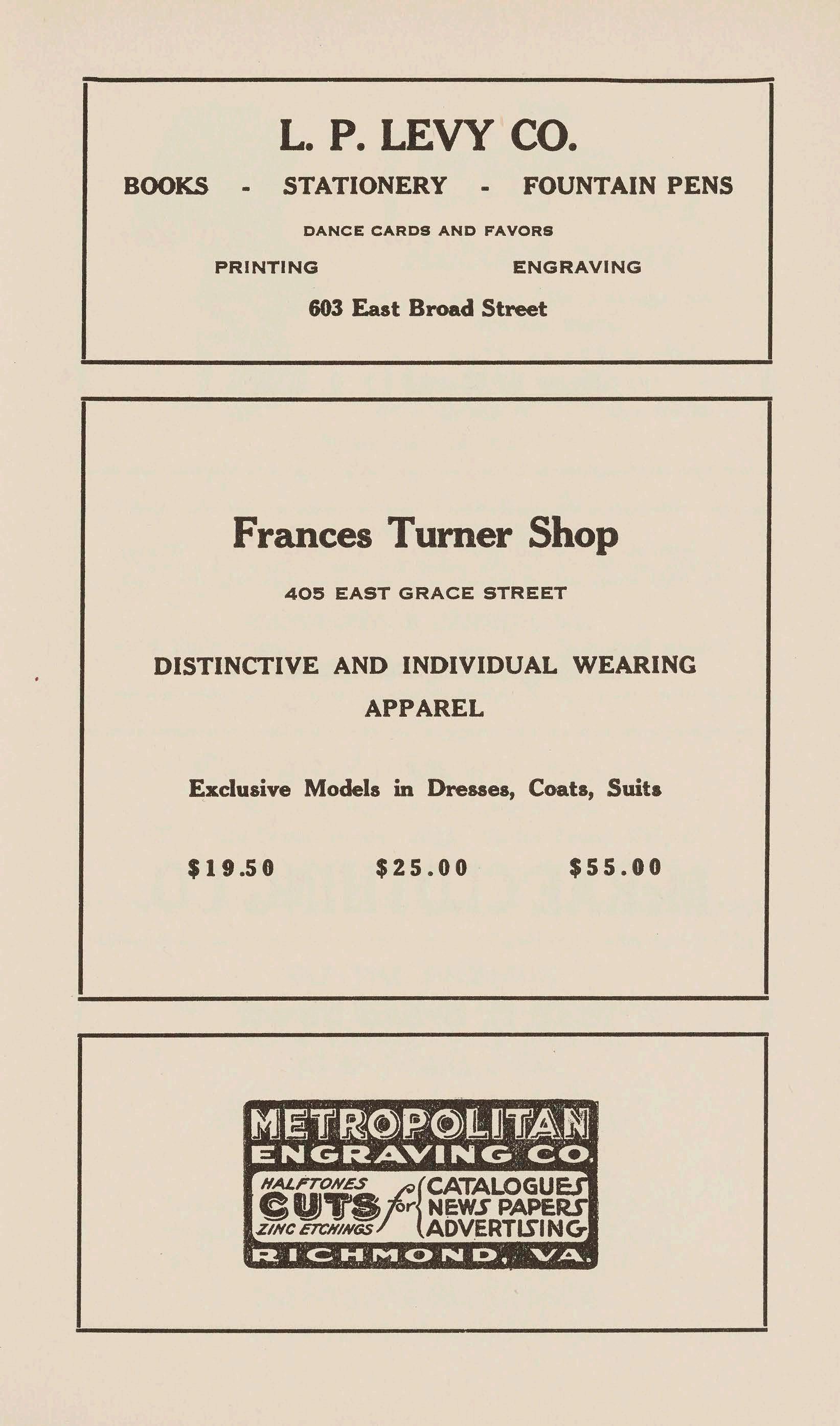


WHEN you order flowers from this good Flower Shop you get the utmost in service that modern facilities and careful attention to details can produce Mail or telephone orders receive the same attention that you would get if you came personally to the store.
BALL TIME!
Get into the Game with Spalding Equipment. Bats, Gloves, Mitts, Masks, Baseball Uniforms EVERYTHING FOR EVERY SPORT
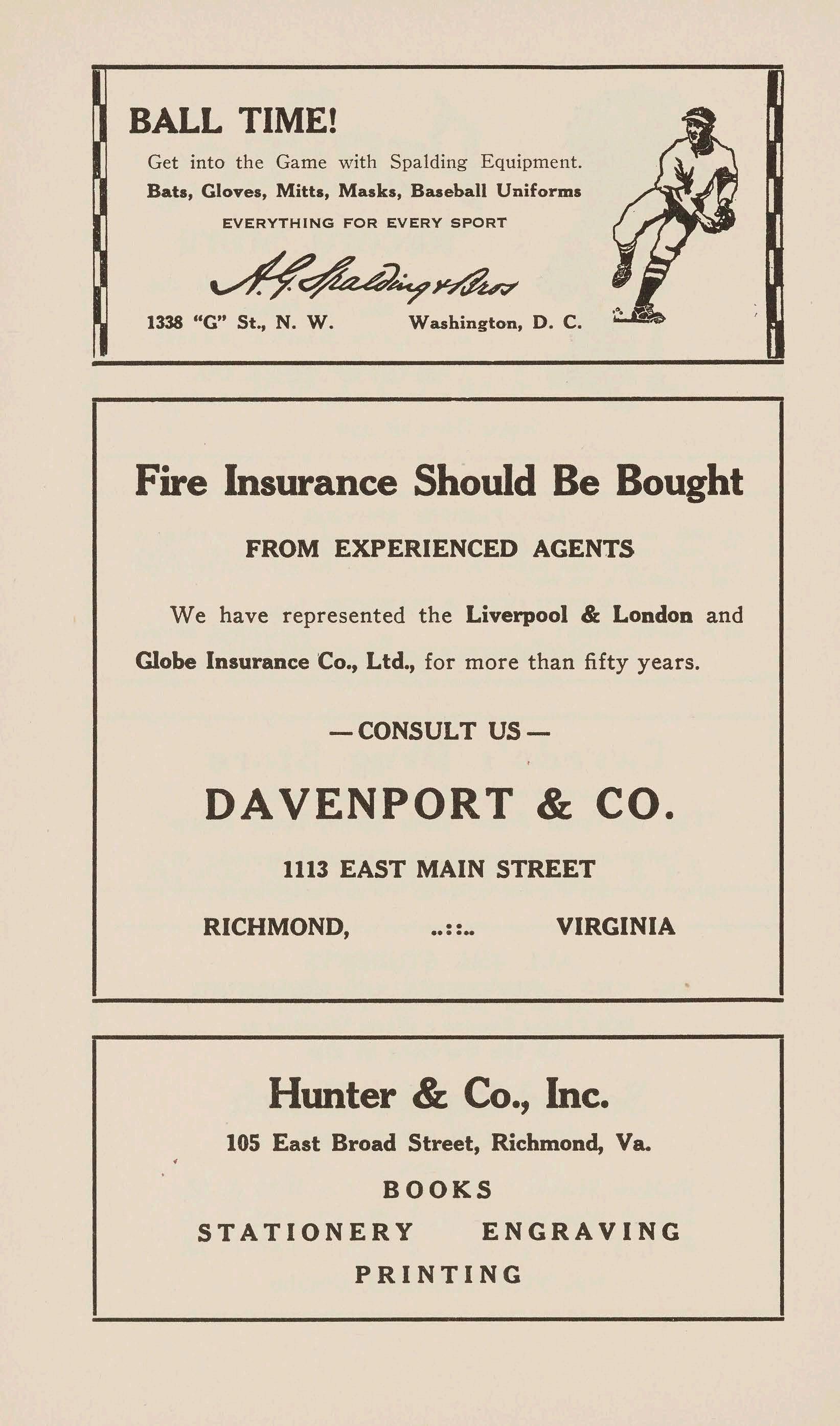
1338 "G" St., N. W. Washington, D. C.
We have represented the Liverpool & London and Globe Insurance Co., Ltd., for more than fifty years.

Mfg. by THE BAUGHMAN STATIONERY CO.
Wholesale School Suppliea
LEA.DING -LARGEST-OLDEST OPTICAL HOUSE SOUTH
Main and Eighth Streets 223 East Broad Street
KODAK FILMS DEVELOPED FREE When Purchased of Us and Prints Are Ordered
MAIL ORDERS GIVEN PROMPT ATTENTION

Boulevard and Grove Avenue
RICHMOND, VA.
-SERVICES
SUNDAY
9 :00 A. M .-BIBLE SCHOOL
11 :00 A. M.-PUBLIC WORSHIP
7 :00 P . M.-B . Y. P. U.
8 :00 P . M.-PUBLIC WORSHIP -WEDNESDAY
8 :00 P . M.-Mrn-WEEK SERVICE w . w. WEEKS, MINISTER
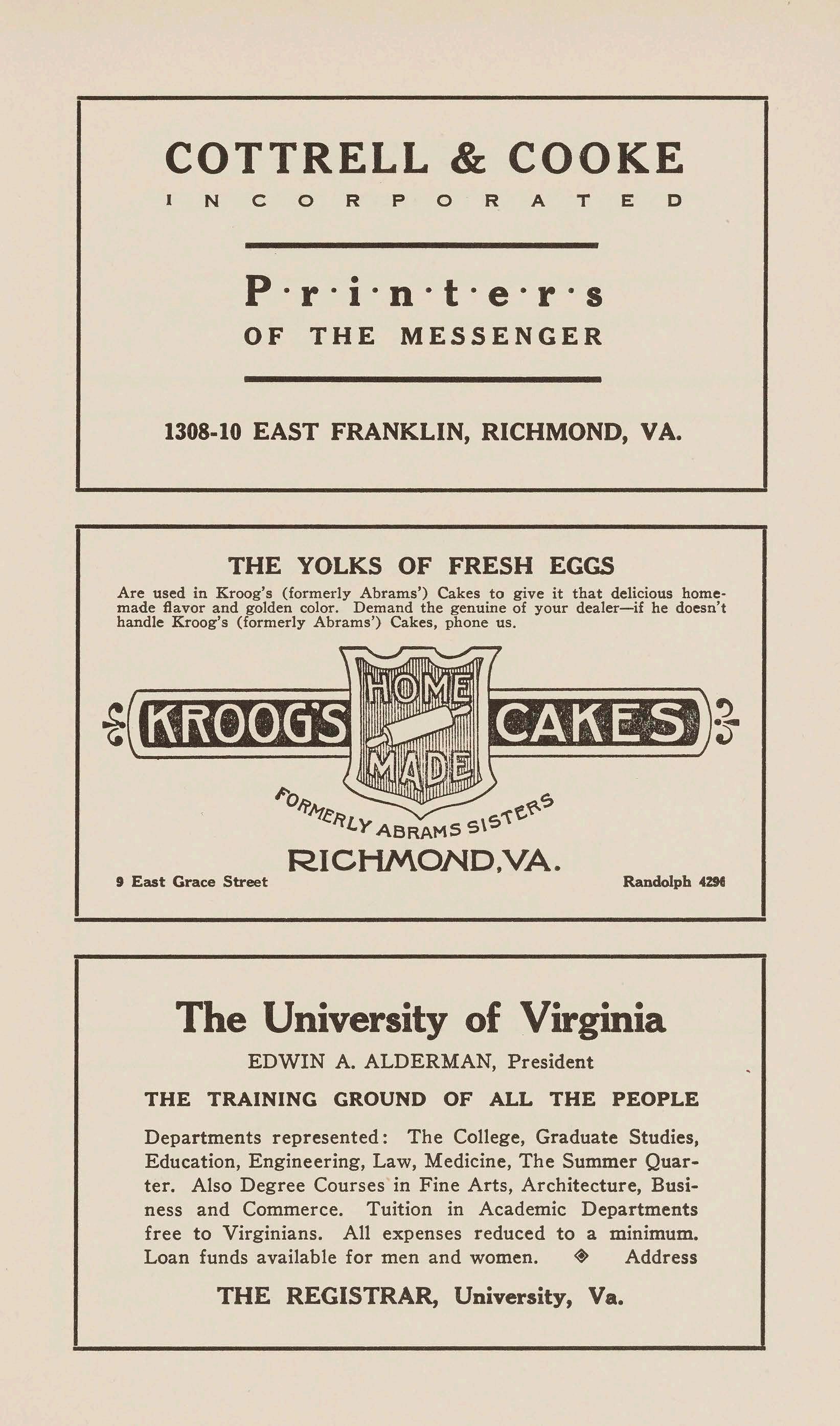
Are used in Kroog's (formerly Abrams') Cakes to give it that delicious homemade flavor and golden color. Demand the genuine of your dealer-if he doesn't handle Kroog's (formerly Abrams') Cakes, phone us.
EDWIN A. ALDERMAN, President
THE TRAINING GROUND OF ALL THE PEOPLE
Departments represented: The College, Graduate Studies, Education, Engineering, Law, Medicine, The Summer Quarter. Also Degree Courses in Fine Arts, Architecture, Business and Commerce. Tuition in Academic Departments free to Virginians. All expenses reduced to a minimum. Loan funds available for men and women. Address
THE REGISTRAR, University, Va.

Brass, Cloisonne, Chinese Vases, Silk Gauze Lanterns
Atlantic Hand Dipped Candles, Novelties
104 East Grace Street Madison 2570

Tuition and room rent free. Scholarships available to approved students. Seminary within 13 miles of Philadelphia. Metropolitan advantages. Seminary's relations to University of Pennsylvania warrant offer of the following courses:
1. Regular Courses for Preachers and .Pastors. Seminary. Degree of B. D. or Diploma.
2. Training for Community Service. Seminary and University. Degrees of B. D. and A. M.
3. Training for Advanced Scholarship. Seminary and University. Degree of Th. M. at Seminary, or Ph. D. at University.
For Information Address
REV. MIL TON G. EVANS, LL. D., President, Chester, Pa.
ROYAL TYPEWRITERS FOR RENT
Special Rates to Students
FACTORY REBUILT MACHINES FOR SALE Easy Payments
A. BARTLETT, Mgr. 737 East Main Street, Richmond, Va.
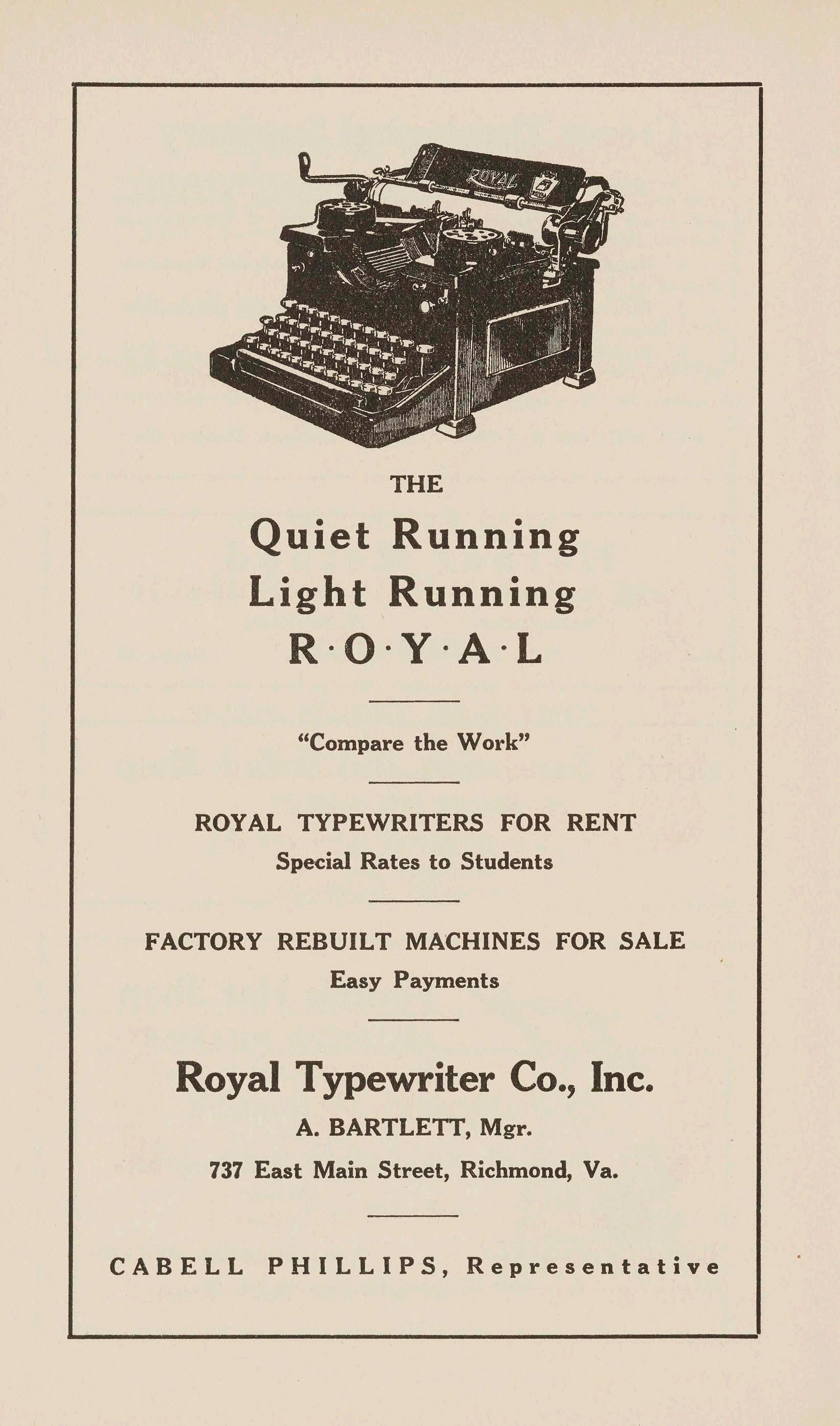
CABELL PHILLIPS, Representative

Will enjoy "browsing" in our store; there is no obligation to make a purchase; you are welcome here at all times.
DON'T JUST SAY

Manufactured by Southern Dairies, Inc.
Style Still Lurks In Your Old Felt
-and we will restore it completely to its original appearance. It's surprising how thoroughly we clean old hats. That's why we say "Save your old hat."
Hats
Bring us your last season's hat and we will remodel it to the new styles -at small cost. New models to try on and select from.
Two Convenient Locations Mail Orders Solicited
Zll-13 N. FIRST STREET 702 EAST MAIN Ran. 909 Mad. S4Z6-W. Representative DAN BEGOR

CORNER BROAD AND ~VELFTH STREETS
REV. GEO. W. McDANIEL, D. D., Pastor
Church Services: Preaching Sundays 11 :00 A. M. and 8 :00 P. M. Prayer Meeting Wednesday 8 :15 P. M.
Sunday School: Meets at 9 :30 A. M. Baraca, Philathea and other organized Bible Classes.
B. Y. P. U.'s: Meet at 7 :00 P. M. Sundays. Fellowship Union meets in Baraca Room. Fidelity meets in Sunday School Auditorium; Loyalty meets in Church Parlor.
"COME THOU WITH US A.ND WE WILL DO THEE GOOD"
Comfortable Convenient Safe
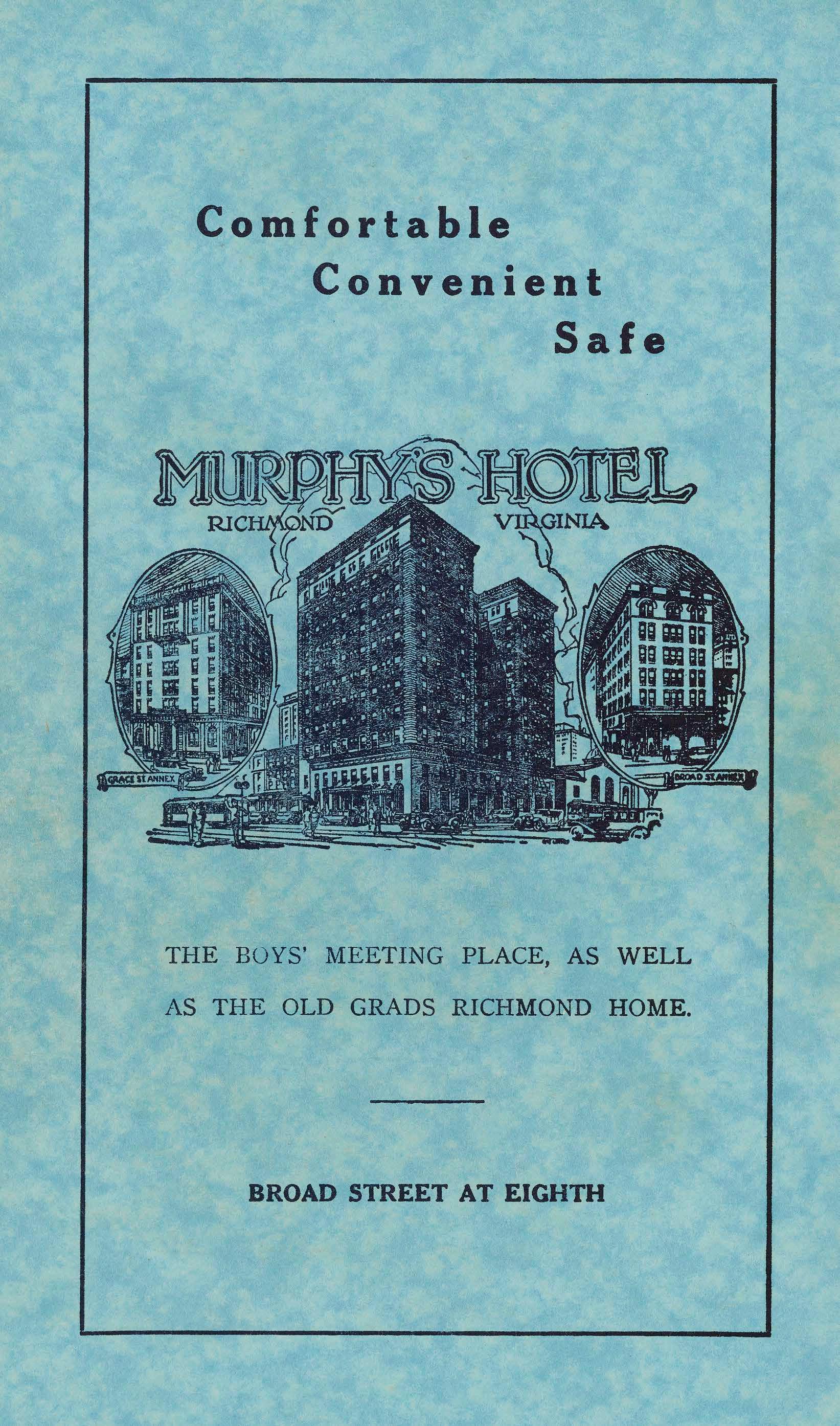
THE BOYS' MEETING PLACE, AS WELL AS THE OLD GRADS RICHMOND HOME.
BROAD STREET AT EIGHTH